- First Trimester
- Second Trimester
- Third Trimester
- Shopping for Twins
- Raising Twins
- Twin Toddler
- Join as Member
- Members Area

Pregnancy and Birth
A space to give you hints about what is happening in the pregnancy and birth world, it’s common problems, and how to solve them
Traveling While Pregnant With Twins
You do not have to lock yourself up in your house the moment you find out you are pregnant for fear of miscarrying, especially if you have been trying for a long time.
It is generally safe for pregnant women to travel even when they are carrying twins. However, there are certain factors and limitations that you must consider before you go on the road or fly long distance when traveling while pregnant with twins. Here are some of them.
Your condition
Always check with your midwife or doctor first before you travel. It is important that you understand the risks. Remember, your health and your baby’s health should be the main priority. Consider how far along you are and if your pregnancy is considered as a high-risk.
Women who are considered high-risk are those who have previous miscarriages, those who are carrying twins or multiples, and those with certain medical conditions that need to be closely monitored.

Travel arrangements and itineraries
If you need to travel for work, to attend an event, or you just need to have a relaxing vacation somewhere and after getting a go-ahead from your midwife or doctor, make travel arrangements that best suits you and plan your itineraries accordingly.
Travelling can be stressful if you are not comfortable, and including extreme activities in your itineraries that can put your baby at risk should be avoided.
Proper preparations
Are you fully prepared to travel even when you are pregnant? Do you feel physically okay? Do you know where to find the nearest healthcare facility at your destination? Do you have an insurance that covers any emergency event during your travel? Is your destination safe from infectious diseases?
You should know all the answer to these questions and other information about your destination before you even pack your bag.
Possible Risks
Here are some possible risks that you should know before you travel.
Deep vein thrombosis (DVT)
This is a health condition where a blood clot forms in any deep vein of the leg. This can cause pain, swelling, inflammations, and other conditions. If you are pregnant, the risk of having deep vein thrombosis is higher.
Long car trips and flying long distance make you stationary for a long period of time, which can put you at higher risk of DVT.
Preterm labor and birth
Airlines have certain restrictions in terms of allowing pregnant women to travel. Most do not allow pregnant women to board the train especially when they are near their due date because of the risk of going into labor and giving birth while on the plane.
There is no medical facility or an expert care provider available to assist you when that happens. You are lucky if there is a doctor on board.
If you are carrying twins or multiples (no matter the type ), you have a higher risk of going into preterm labor and birth. Your doctor or midwife might not allow you to travel international or long distance because of your condition.
Pregnancy discomforts especially with twins or multiples
It is hard to make and grow a human being inside the womb. Although it is something you have been waiting for a long time, it is not exactly the most comfortable journey.
Imagine feeling so ill and nauseous or having the urge to pee every hour while you are on the road or on a 20-hour flight to another continent. Not addressing these problems may result in a lot of stress and feeling more ill.
It is believed that symptoms are generally worse when you are pregnant with twins or multiples . Consider this before deciding to travel to avoid stress. Stress and pregnancy do not go together.
Radiation
Cosmic radiation usually comes from the outer space. It is composed of high-energy particles that can be very dangerous when you get too exposed. The risk is very low on the ground but it increases as the altitude rises.
A single flight does not expose you to this radiation. However, the risk is higher if you are a frequent flyer or you work as a cabin crew.
Weather and infectious diseases
A sudden change of weather condition can make you sick. Aside from making sure you are aware of what the weather will be like in your destination, you should also know if there are current diseases or a new epidemic prevalent in that place or country.
This will better equip you on what to do, what to bring, or if you have to change your plans altogether.
When to Travel
If you are in the early stage of pregnancy , your hormones are on the rage. This can cause you to feel the peak of all your pregnancy symptoms that may result in a lot of discomforts during your travels.
However, if you are one of the lucky ones who does not suffer from most pregnancy symptoms and on top of your health with a go-ahead from your doctor, then go ahead and book that ticket.
The ideal time for pregnant women to travel is during mid-pregnancy or second trimester . If you are like most women, you will notice that your nausea is waning and you are regaining your energy. Your appetite is better, fatigue is quite manageable, and there is a lesser urge to pee.
If you are planning a babymoon with your spouse or partner, it is best to schedule it in the second trimester. You should take this time to have a break and relax before the baby arrives. However, you still have to be fully prepared and careful.
You are in your last trimester and only a few weeks away from welcoming your baby. This is the time where you should be really careful when traveling, especially if you are carrying twins or multiples.
You can probably still travel around or in nearby cities from where you live, but your doctor or midwife might not allow you to travel a long distance or fly internationally. This is for you and your baby’s safety.
What to Prepare
- Water – It is important to stay hydrated at all times when you are pregnant.
- Snacks – eating small meals throughout the day can help ease nausea. Bring snacks like crackers or fruits when traveling for a long period of time.
- Medical records – always bring your medical records including a medical certificate from your doctor when you are traveling.
- Insurance – make sure your insurance covers any emergency event during your travels.
- Medications – always bring your prenatal vitamins and other medications when you travel.
- Vaccinations – protect yourself and your unborn child from any viruses or diseases that you might catch in your destination. Get a flu shot and anti-malaria or Zika virus protection before you leave.
- Comfortable clothes – Bring the most comfortable and appropriate clothing when traveling. Include compression stockings that you can wear to avoid DVT.
You can still continue living your life when you are pregnant. Pregnancy is not a disease. However, travelling in your condition requires a bit more thought and planning.
Always consult your doctor or midwife first before travelling. Refer to this post and follow the guidelines mentioned above. If you have any questions about traveling while pregnant with twins or multiples, feel free to leave a message.
LEAVE A REPLY Cancel reply
Log in to leave a comment
Most popular
How to choose the best toys for 2-year-old twins, preparing for twins with a toddler: our top tips, looking for identical twin girl outfits here’s what to consider, 10 baby shower food ideas, the best pregnancy test of 2022, related articles, what are the odds of having twins, uncommon signs of pregnancy, how to read your twin baby bump, how to throw the perfect virtual baby shower, discover our best-selling twin products, andrea, mother of twins, become a member.
A community for pregnant moms & parents of twins.
Access to a Group of 10,000+ Parents of Twins
Exclusive discounts to over 50 brands
Exclusive and regular Giveaways
Amazon Associates Program
Twinstuff.com is a participant in the Amazon Services LLC Associates Program, an affiliate advertising program designed to provide a means for sites to earn advertising fees by linking to Amazon.com.
Our Categories
- Twins Toddlers
- Shopping For Twins
TwinStuff.com does not intend to provide medical advice. We do our very best to provide useful information about twins, including pregnancy and infancy; however, the content on this blog is not a substitute for medical guidance. For more information, please read our privacy policy.
PO Box 630716, Miami, FL 33163
- Earnings Disclaimer
- Privacy/Cookie Policy and Terms & Conditions
- Search Please fill out this field.
- Newsletters
- Sweepstakes
11 Rules for Road Trips While Pregnant, Including When To Stop Traveling by Car
A car trip can be a memorable vacation while pregnant, especially if flying is out of the question, but there are some precautions to take before you hit the road.
Everyone loves a good road trip. And if you're pregnant, a babymoon by car may be exactly what's needed before you're elbows-deep in dirty diapers. While it's generally safe to fly while expecting , some airlines have a cutoff of 36 weeks (and many even earlier), according to the Centers for Disease Control and Prevention (CDC).
Pregnant people who do fly should check with their doctors first, but they can make travel safer with simple steps like holding onto seatbacks when walking during turbulence and wearing compression socks to prevent deep vein thrombosis.
The great news is that car travel is safe for most pregnant people. If you have complications, you may need to stick closer to home but unless you're on bedrest or have other doctor-imposed limitations, you should be able to hit the road. Ask your health care provider when you should stop long road trips, but in most cases, it's safe until close to your due date.
To ensure the only bump on the road is your belly, here are 11 tips pregnant travelers should know before setting off on a long drive.
1. Talk To Your Health Care Provider
No matter the mode of travel, pregnant people should always start by contacting their health care provider, said Kecia Gaither, MD , maternal-fetal medicine specialist affiliated with NYC Health + Hospitals/Lincoln in the Bronx, New York. "Certain medical conditions may preclude any degree of travel, be it by air or land," says Dr. Gaither. "Those conditions may include placenta previa , prior preterm labor , or clotting disorders."
Placenta previa, for example, happens when the placenta completely or partially covers the cervix. It can cause bleeding during pregnancy, as well as serious complications—like hemorrhage or preterm birth—that would be difficult to navigate in an unfamiliar location.
Additionally, traveling is a risk factor for blood clots, according to the CDC—and pregnant people already have a heightened chance of developing them. Certain conditions and disorders may increase the risk of blood clots too much for long road trips.
2. Plan for Your Second Trimester
The American College of Obstetricians and Gynecologists (ACOG) says the ideal time to travel is during the second trimester, between 14 and 28 weeks. "During these weeks, your energy has returned, morning sickness is improved or gone, and you are still able to get around easily," recommends the organization. "After 28 weeks, it may be harder to move around or sit for a long time."
Not only is the middle of the pregnancy when pregnant people will likely feel the best, but it also carries a lower risk of any complications.
3. Prepare for the Pregnancy Road Trip
Advanced planning can make any road trip easier. This includes thoughtful packing like easy-to-change clothing if you get too hot or too cold and taking healthy foods, snacks, and drinks. Also, make sure your route is accurate to avoid delays and check for safe places to stop.
4. Drink Enough Water
There's a link between dehydration and uterine contractions, so keeping on top of water intake is crucial, says Dr. Gaither. Have a sufficient supply of water readily available in the car and make sure to drink even more if you've been sweating or exercising. Pregnant people should drink eight to 12 cups (or 64 to 96 ounces) of water each day, according to ACOG. This ensures healthy digestion, amniotic fluid formation, and nutrient circulation.
5. Bring Extra Medications or Supplements
Taking the proper medications and supplements while pregnant is imperative, and it's even more important on a road trip. Dr. Gaither says pregnant travelers will want to double-check that they've packed any medications and vitamins they need.
It's also important to bring extra, in case they're on the road longer than originally anticipated. Include over-the-counter medicines approved by your health care provider, so you'll have them if you need them. And, don't forget to pack your prenatal vitamin !
6. Always Wear a Seat Belt
Wearing a seat belt in a car is one of the most important car safety tips, especially when you're pregnant. The myth that a seat belt could harm the fetus is pure fiction, but there's a proper way to wear one if you're pregnant, according to the National Highway Traffic Safety Administration (NHTSA).
Pregnant people should wear the shoulder belt away from their neck and across their chest. The lap belt should be secured below the belly so it fits snugly. Pregnant people should also keep as much distance as possible between their belly and the steering wheel, while still ensuring they can reach the wheel and pedals. Additionally, the NHTSA recommends pregnant people don't disable the airbags.
7. Get Out and Stretch Often
Dr. Gaither says pregnant travelers should stop "at least every two hours" and get out of the car, stretch, and walk around. This increases blood flow to the lower body which helps prevent complications like deep vein thrombosis (DVT) in the legs. These blood clots usually dissolve on their own. However, in rare cases, they can break off, travel to the lungs, and block blood flow. This potentially life-threatening condition is called a pulmonary embolism.
While the risk for DVT is low, it does increase with pregnancy. The CDC recommends knowing the signs of DVT, which include swelling and/or redness in the leg (or arm), unexplained pain or tenderness, and skin that feels warm when touched. Signs of a pulmonary embolism include difficulty breathing, fast or irregular heartbeat, and chest pain or discomfort.
8. Dress Comfortably
Being comfortable during pregnancy is key, and that's especially true during a road trip. Luckily, a few essentials can make the ride more relaxing—and safer. Non-medical compression socks or support hosiery may be a good idea to help support blood flow.
Other helpful travel accessories include a lumbar pillow, comfortable shoes, and a good water bottle (because hydration is key to a healthy pregnancy ). A cooler, sunglasses, and sunscreen also may be helpful. And, avoid wearing too-tight clothing and shoes.
9. Avoid Remote Locations
Nothing is stopping most pregnant people from traveling, but it's always smart to be mindful of where you're going. If possible, maintain a steady speed (instead of speeding up and slowing down) and avoid winding, hilly, bumpy roads, and frequent lane changes. Also, don't travel to extremely remote areas where medical care may be difficult to find in case of an emergency.
10. Have an Emergency Plan in Place
Pregnant travelers will want to have a plan in case any unexpected health concerns pop up, as they can happen quickly during pregnancy. If you don't have access to an electronic health record, take a copy of your medical record with you. If any problems do arise during a road trip, Dr. Gaither recommends pregnant people contact their health care provider and the nearest hospital for advice, evaluation, and possible treatment.
11. Relax and Have Fun
There are lots of things to take into consideration when planning a road trip while pregnant, but always remember to have fun! Advanced planning and a comfortable wardrobe will help make the trip easier. Plan a trip you're excited about and indulge in a little pre-baby R&R.
Pregnant Travelers . Centers for Disease Control and Prevention . 2022.
Blood Clots and Travel: What You Need to Know . Centers for Disease Control and Prevention . 2023.
Travel During Pregnancy . American College of Obstetricians and Gynecologists . 2023.
How Much Water Should I Drink During Pregnancy? . American College of Obstetricians and Gynecologists . 2020.
If You're Pregnant: Seat Belt Recommendations for Drivers and Passengers . National Highway Traffic Safety Administration .
Related Articles
Find support
Many parents and parents-to-be face a world of unknowns, but they all want a healthy and strong start. That's where we come in. Explore a variety of topics and resources here.
- Community Stories
- Support In Your Area
- Compass by March of Dimes™
- Ovulation calculator
- Ovulation calendar
Ways to give
There are so many ways to support our research, education, advocacy and programs. Give today to ensure that every family is healthy and strong now and tomorrow.
- Give with Donor-Advised Fund
- Stock and IRA Charitable Rollovers
- March for Babies
- Fundraise Your Way
- March of Dimes Innovation Fund
- Roosevelt Society
- Legacy Giving: Wills, Trusts, and Estates
Addressing the maternal and infant health crisis is not straightforward with one solution. It takes strategic and collaborative efforts in different areas to ultimately benefit thousands of moms, babies and families every day. Discover more here.
- ICBD Conference
- Mom and Baby Action Network
- Policy & Advocacy
- Public Health Data Reports
- For Health Professionals
- NICU Initiatives
- NICU Family Support
We're committed to ending preventable maternal health risks and death, ending preventable preterm birth and infant death and closing the health equity gap for all families. Learn more about our legacy and impact here.
- Accomplishments
- Annual Reports
- In Your Area Find opportunities to get involved
- Volunteer Help us by being on the frontlines
- Advocate Join us in the fight of all moms and babies
- Partner Collaborate to make a difference for families
- Donate Help us by making a donation
- Careers Discover your chance to make a big impact
- See all ways to Get Involved
Travel during pregnancy
Being pregnant doesn’t mean you have to be stuck at home. If you’re going on a business trip or taking a vacation, there are ways you can stay healthy and safe when traveling during pregnancy.
Is it safe to travel when you’re pregnant?
If you have a healthy pregnancy, it’s usually safe to travel. But talk to your health care provider before planning any trip.
If you have a health condition, such as heart disease, or if you’ve had pregnancy complications, such as gestational diabetes , your provider may suggest you limit travel.
Even if your pregnancy is healthy, tell your provider about your travel plans. You may need to rearrange your prenatal care visits so you don’t miss any while you’re away.
When is the best time to travel during pregnancy?
The best time to travel depends on how you feel. Many pregnant women like to travel during the second trimester. At this time, you may not have as much morning sickness or be as tired as you were at the beginning of your pregnancy. And while your belly’s getting bigger, it’s still comfortable for you to move around. As you get closer to your due date , walking, sitting and even sleeping can be very uncomfortable.
During the second trimester, you’re also less likely to have a pregnancy emergency, such as miscarriage or preterm labor. Miscarriage is when a baby dies in the womb before 20 weeks of pregnancy. Preterm labor is labor that happens too early, before 37 weeks of pregnancy.
How can you get ready for your trip?
Plan ahead and follow these tips to stay safe when traveling during pregnancy:
- Ask your airline if they have a cut-off time for traveling during pregnancy. You can fly on most airlines up to 36 weeks of pregnancy. But if you’re flying out of the country, the cut-off time may be earlier.
- Check to see what medical care your health insurance covers. Health insurance helps you pay for medical care. Most insurance plans cover emergency medical care no matter where you are. But you need to know what your plan means by “emergency” to know exactly what it will pay for.
- Think about buying travel insurance. This is insurance you buy in addition to your regular health insurance. It covers you for medical care while traveling in another country. You also can buy travel insurance that refunds some of your costs if you have to cancel your trip. Visit USA.gov to learn more about the different kinds of travel insurance.
- Learn about medical care available where you’re headed. Your provider may be able to recommend a provider in the area where you’re going. If you’re traveling in the United States, you can find a provider through the American Medical Association . If you’re traveling overseas, find a provider through the International Association for Medical Assistance to Travelers’ database .
- Pack a copy of your medical records, your provider’s phone number, your prenatal vitamins and any medicine you need. Keep these things in your purse, a carry-on or a bag you plan to have with you at all times. This way, they’re always handy.
- Visit the Centers for Disease Control and Prevention (CDC) for information about vaccinations , travel alerts , managing health conditions during your trip and other ways you can stay healthy during travel.
- If you can, travel with someone. Don’t travel alone if you don’t have to.
Is it safe to travel to places where Zika is spreading if you're pregnant?
Zika virus (also called Zika) can cause illness that lasts several days to a week. It usually spreads to people through mosquito bites. But if you get infected with Zika during pregnancy , you can pass the virus to your baby. Zika infection during pregnancy can cause serious problems for your baby.
If you're pregnant or trying to get pregnant, don't travel to a Zika-affected area unless you absolutely have to. If you do travel, protect yourself and your family from mosquito bites. Check CDC travel alerts often for updates.
When should you seek medical care during travel?
If you have any of the following signs and symptoms during your trip, get medical help right away:
- Belly pain or cramps
- Contractions (when the muscles of your uterus get tight and then relax)
- Severe headaches
- Leg swelling or pain
- Vaginal bleeding (when blood comes out of your vagina) or you pass blood tissue or clots
- Vision problems
- Your water breaks. This can be in a large gush or a continuous trickle.
How can you stay safe when traveling by plane?
If your pregnancy is healthy, it’s usually safe to travel by plane.
Follow these tips when traveling by air:
- If you’ve had morning sickness during pregnancy, ask your provider if you can take medicine to help with nausea.
- Book an aisle seat so you don't have to climb over other passengers when you need to get up to use the restroom or walk around. Try sitting towards the front of the plane where the ride feels smoother.
- Drink plenty of water. Don’t drink carbonated drinks, such as soda. And don’t eat foods, such as beans, that may cause gas. Gas in your belly can expand at high altitudes and make you feel uncomfortable.
- Fasten your seat belt when you’re in your seat. This can help keep you from getting hurt in case of turbulence. Turbulence happens when the air around a flying plane causes a bumpy ride.
- Wear loose, comfortable clothing. Flex your ankles during the flight, and take a walk when it's safe to leave your seat. Doing these things can help your blood flow and lower your risk of deep vein thrombosis (DVT), a blood clot inside a vein. Sitting for long stretches of time during any kind of travel raises your chances of having DVT. Ask your health care provider if you should wear support stockings during your flight. They may help prevent DVT. But if you have diabetes or problems with blood circulation, you probably shouldn’t wear them.
- Tell the flight attendant if you feel sick or very uncomfortable during your flight. Contact your provider as soon as you can.
How can you stay safe when traveling by car?
If you're pregnant and traveling by car, follow these tips:
- Wear your seat belt.
- Try not to drive more than 5 to 6 hours per day. If you can, break your trip into several days with shorter drive times each day.
- During long drives, drink water, wear loose-fitting clothes and take breaks to get out of the car to walk around and stretch. And ask your provider if you should wear support stockings. Doing these things can lower your risk of DVT. Don’t turn off your car’s air bags. Airbags can keep you and your baby safe in a crash.
- Tilt your seat and move it as far as possible from the dashboard or steering wheel. If you’re driving, though, make sure you can reach the foot pedals.
- If you’re in an accident, get medical help right away.
How can you stay safe when traveling by ship?
If you’re pregnant and traveling on a ship, such as a cruise vacation, follow these tips:
- Call your cruise line to confirm that a health care provider will be on the ship at all times. Ask what medical care may be available at each port stop. Ask if your ship has passed a CDC health inspection .
- Ask your provider if you can take medicine to help prevent or treat sea sickness.
- Wash your hands often and wash any fruits and vegetables you eat during the cruise to help avoid getting infections.
How can you stay safe when traveling out of the country?
If your pregnancy is healthy, it may be safe for you to travel abroad. But check with your provider before you make plans. If you have certain pregnancy complications, such as incompetent cervix (when the cervix opens too early), or if you’re pregnant with twins, triplets or more , your provider may recommend that you not travel out of the country.
If you’re thinking about traveling out of the country, follow these tips:
- Talk to your provider about your travel plans. Ask about pregnancy complications and if it’s safe to travel to the country you’re planning to visit. Ask your provider about vaccinations you need before your trip and about taking medicine with you.
- Find out what your health insurance covers when traveling outside the country. And think about buying travel insurance.
- Find a provider or a medical center in the country you’re planning to visit before you leave home. Look for a center where providers can manage pregnancy complications, perform emergency cesarean sections (c-sections) and care for premature babies. The International Association for Medical Assistance can help find this kind of information.
- Make sure the country you’re planning to visit regularly screens stored blood for HIV , hepatitis B and hepatitis C. This is very important if you need a blood transfusion or if your baby is at risk of Rh disease . Visit the U. S. Department of State website for information on blood screening by country.
- Take a copy of your medical records with you. Know what your blood type is.
- Register with the American embassy or consulate once you arrive. Staff there can help if you need to get out of the country during an emergency.
- If you don’t speak the local language, take a dictionary.
Last reviewed: April, 2016
Navigating Travel Restrictions For Twin Pregnancy: What You Need To Know
- Last updated Nov 04, 2023
- Difficulty Advanced
- Category United States
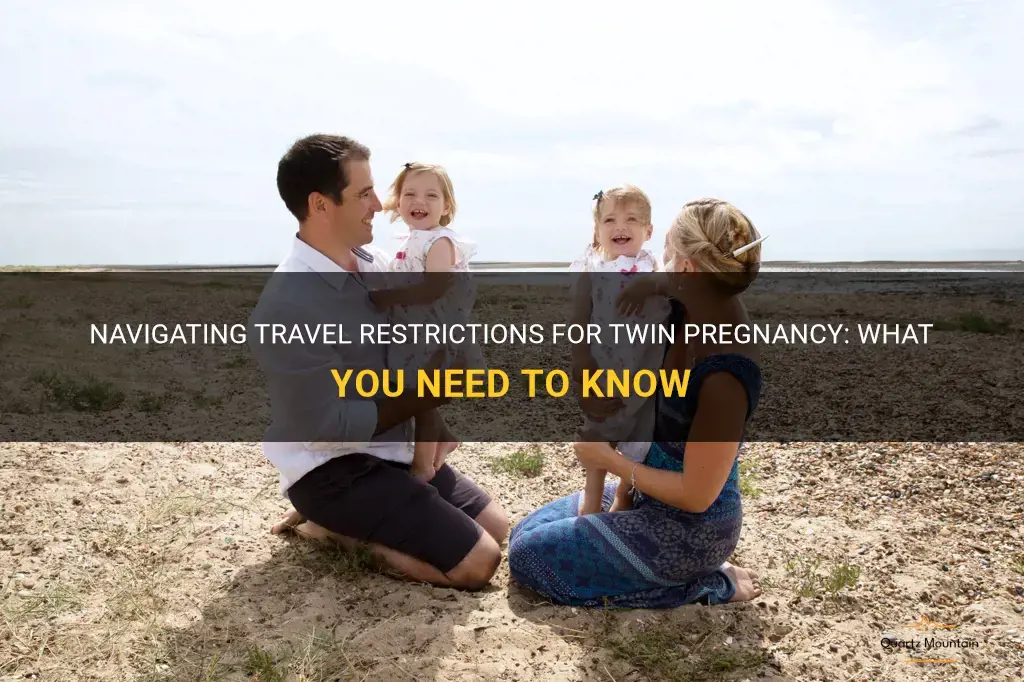
Travel restrictions for twin pregnancies can be a cause for concern and confusion for expecting mothers. With the multiple factors and risks associated with carrying twins, many airlines and countries have implemented specific regulations and precautions to ensure the safety and well-being of both the mother and the unborn babies. From limitations on the gestational age for flying to potential health concerns, navigating the world of twin pregnancy travel is a unique journey in itself. In this article, we will explore the various restrictions and considerations that expecting mothers of twins need to be aware of when planning their travel arrangements.
What You'll Learn
Are there any travel restrictions for pregnant women carrying twins, do airlines have any specific policies regarding travel restrictions for women with twin pregnancies, are there any specific medical concerns or risks associated with traveling while carrying twins, are there any countries or regions that have stricter travel restrictions for women with twin pregnancies, what are some alternative options or precautions for women carrying twins who want to travel.

Pregnancy is an exciting and joyful time in a woman's life, but it can also bring about certain precautions and restrictions, especially when it comes to traveling. When a woman is pregnant with twins, these restrictions may be even more important to consider. This article aims to provide information on the travel restrictions for pregnant women carrying twins, taking into account scientific research, expert advice, and real-life experiences.
First and foremost, it is crucial for pregnant women carrying twins to consult with their healthcare provider before making any travel plans. Every pregnancy is unique, and the specific circumstances of carrying twins may require additional precautions. A healthcare provider will be able to assess the individual's health, the health of the twins, and any potential risks that may arise during travel.
Scientific research on the topic provides some insights into the potential risks associated with traveling while pregnant with twins. A study published in the Journal of Obstetrics and Gynaecology Canada found that multiple pregnancies, including twin pregnancies, are considered high-risk pregnancies. The study concluded that travel during high-risk pregnancies should be approached with caution and be evaluated on a case-by-case basis.
Based on expert advice, it is generally recommended for pregnant women carrying twins to avoid long-distance travel after the 24th week of pregnancy. This is due to the increased risk of preterm labor, preeclampsia, and other complications that may arise. Additionally, air travel should be avoided after the 32nd week of pregnancy, as many airlines have restrictions in place for women beyond this stage of pregnancy.
Real-life experiences of women carrying twins also shed light on the potential challenges and restrictions they face when traveling. Sarah, a mother of twins, shared her story of traveling during her twin pregnancy. She explains that her healthcare provider advised her to avoid any unnecessary long-distance travel after the 24th week, as the risk of complications increases significantly. She did, however, take short road trips within her home state with her partner, ensuring they had access to medical facilities if needed.
In conclusion, there are travel restrictions for pregnant women carrying twins, and it is important to be aware of and follow these guidelines to ensure the health and safety of both the mother and the twins. Consulting with a healthcare provider is crucial to assess individual circumstances and potential risks. Scientific research, expert advice, and real-life experiences contribute to the understanding of these restrictions. Pregnancy should be a time of joy and excitement, and taking the necessary precautions during travel ensures a smooth and healthy journey for both the mother and the twins.
Understanding the Current Travel Restrictions in Square - What You Need to Know
You may want to see also
Traveling during pregnancy can be an exciting but also challenging experience, especially for women carrying twins. It is important for expectant mothers to prioritize their health and the health of their babies, which may involve considering travel restrictions. Many airlines have specific policies in place to ensure the safety and well-being of pregnant travelers, including those with twin pregnancies.
When it comes to twin pregnancies, the guidelines from airlines tend to be more cautious compared to singleton pregnancies. This is because carrying multiples puts extra strain on the mother's body and may increase the risk of complications. The policies from different airlines can vary, so it is essential for pregnant travelers to review the specific guidelines provided by their chosen airline.
In general, most airlines allow pregnant women to travel up until a certain gestational age, typically around 36-37 weeks for a singleton pregnancy. However, for twin pregnancies, the cut-off point may be earlier, often between 28-32 weeks, depending on the airline. This is due to the increased risk of preterm labor and other complications associated with carrying twins.
Some airlines may require a medical certificate or clearance from a healthcare provider for women with twin pregnancies to travel after a certain gestational age. This certificate may need to state that the pregnant woman is fit to travel, without any complications or risks that could jeopardize her health or the health of the babies.
It is important for pregnant women to consider the duration of the flight when making travel plans. Long-haul flights can be particularly tiring and uncomfortable, even for non-pregnant individuals. Carrying twins can make these journeys even more challenging, as the risk of blood clots and deep vein thrombosis (DVT) increases during pregnancy. Therefore, it is advisable for pregnant women to choose shorter flights or take frequent breaks to walk and stretch during long journeys.
In addition to the specific guidelines from airlines, it is crucial for pregnant women to consult with their healthcare provider before making any travel plans, especially when carrying twins. Healthcare providers can assess the individual's risk factors, overall health, and any potential complications that may arise during travel.
It is also recommended to check with the destination country's entry requirements and any potential quarantine regulations that may be in place. Travel restrictions and policies related to the pandemic can vary widely, and pregnant travelers should stay updated on the latest information and guidelines to ensure a safe and stress-free journey.
In conclusion, airlines do have specific policies regarding travel restrictions for women with twin pregnancies. These policies generally involve stricter guidelines and earlier cutoff points for pregnant travelers carrying twins. It is important for expectant mothers to review the specific policies of their chosen airline, consult with their healthcare provider, and consider the duration of the flight before making any travel plans. By prioritizing their health and the health of their babies, pregnant women can ensure a safe and enjoyable travel experience.
Navigating Accra: Understanding Travel Restrictions and Requirements
Expecting twins is an exciting and unique experience, and it brings with it its own set of challenges. One such challenge is traveling while carrying twins. While traveling can be enjoyable and adventurous, it is essential to consider the specific medical concerns and risks associated with this kind of journey. In this article, we will discuss some important factors to consider and precautions to take when traveling while carrying twins.
Consult with your healthcare provider:
Before embarking on any trip, it is important to consult with your healthcare provider, particularly if you are carrying multiples. Your doctor is the best person to assess your overall health and determine if you are fit to travel. They can also provide specific advice based on your individual pregnancy and any medical conditions you may have.
Plan your trip carefully:
When traveling with twins, planning becomes crucial. Choose your destination wisely, taking into consideration factors such as the availability of medical facilities, accessibility, and the quality of healthcare in case of any unforeseen circumstances. It is also advisable to choose a destination that is not too far from home, as long journeys can be physically demanding and uncomfortable for pregnant women.
Stay hydrated and well-rested:
Pregnant women, especially those carrying twins, should make it a priority to stay hydrated and well-rested during any trip. Drink plenty of water to prevent dehydration, as it can lead to complications such as preterm labor or uterine contractions. Adequate rest is also essential for the well-being of both the mother and the babies.
Prenatal care and check-ups:
While traveling, it is vital to continue with regular prenatal care and check-ups. Make sure to carry all relevant medical records and contact information for your healthcare provider. In case of any emergencies or concerns, it is crucial to have access to medical care, even if you are away from home.
Comfort and safety during transportation:
When traveling while carrying twins, it is important to prioritize your comfort and safety during transportation. Opt for comfortable seating arrangements, such as requesting an aisle seat on a plane or a train. Regularly stretch your legs, and take breaks when traveling long distances to prevent blood clots. It is also advisable to wear compression stockings to help improve blood circulation and reduce the risk of developing deep vein thrombosis.
Pack essential items:
Ensure that you pack all the essential items you may need during your trip. This includes your prenatal vitamins, any prescribed medications, comfortable clothing, and appropriate footwear. It is also recommended to carry snacks to maintain your energy levels and avoid hunger.
Be mindful of the limitations:
While it is important to prioritize your well-being and enjoy your trip, it is equally essential to be mindful of your limitations. Understand that carrying twins can be physically demanding, and there may be activities or situations you need to avoid. Listen to your body and don't push yourself beyond your comfort zone.
In conclusion, traveling while carrying twins can be a memorable experience if proper precautions and medical concerns are taken into account. Consult with your healthcare provider, plan your trip carefully, stay hydrated and well-rested, prioritize prenatal care, ensure comfort and safety during transportation, pack essential items, and be mindful of your limitations. By following these guidelines, you can enjoy a safe and enjoyable journey while creating beautiful memories during your twin pregnancy.
Exploring the Latest Florida Travel Restrictions: What You Need to Know
Traveling while pregnant can be a concern for many women, especially those carrying twins. The safety and well-being of both the mother and the unborn babies are of utmost importance, and some countries or regions may have stricter travel restrictions for women with twin pregnancies. This article will explore some of the potential restrictions and precautions that women with twin pregnancies might face when traveling to certain destinations.
It is important to note that each country or region may have different regulations and guidelines for pregnant travelers, and it is always advisable to consult with a healthcare professional before making any travel plans. Additionally, the duration and stage of the pregnancy, as well as any existing medical conditions, can also play a significant role in determining the appropriateness of travel.
One common concern for pregnant women, including those with twin pregnancies, is the risk of preterm labor. Preterm labor is a leading cause of neonatal mortality and morbidity, and certain factors, such as multiple pregnancies, can increase the risk. As a result, some countries or regions may have stricter travel restrictions for women with twin pregnancies in order to minimize the chances of preterm labor while away from home.
For example, some countries or regions may require pregnant travelers to provide medical clearance from their healthcare provider stating that it is safe for them to travel. This may involve a thorough examination of the mother's overall health and the babies' development to ensure that the trip will not put them at an increased risk. Additionally, some destinations may require pregnant travelers to have travel insurance that covers any potential pregnancy-related complications.
Another concern for pregnant women, including those with twin pregnancies, is the availability and quality of medical care at their travel destination. In the event of a medical emergency or complications, it is crucial for pregnant travelers to have access to the appropriate healthcare facilities and professionals. Some countries or regions may have stricter travel restrictions for women with twin pregnancies if they do not meet the necessary medical infrastructure requirements.
For instance, destinations with limited medical facilities or resources may advise against traveling for pregnant women with twin pregnancies. This precaution is taken to ensure that the required level of care, including specialized prenatal monitoring and potential emergency interventions, can be provided if needed. It is important to research and plan accordingly when choosing a travel destination, especially when carrying multiple pregnancies.
In some cases, airlines or transportation providers may also have specific policies regarding pregnant travelers, including those with twin pregnancies. These policies may include restrictions on the stage of pregnancy at which a woman can travel or requirements for medical clearance or documentation. Some airlines may also restrict pregnant travelers from flying after a certain gestational age, particularly for women with twin pregnancies, due to the increased risk of complications during flights.
In conclusion, while there are no universal travel restrictions for women with twin pregnancies, some countries or regions may have stricter guidelines in place to ensure the safety and well-being of both the mothers and their unborn babies. It is important for pregnant women, including those carrying twins, to consult with their healthcare providers and carefully consider the potential risks before making any travel plans. By taking the necessary precautions and being well-informed, pregnant women can make informed decisions about their travel plans and prioritize the health and safety of themselves and their unborn babies.
Exploring Ghana amidst COVID-19: A Guide to Current Travel Restrictions
Traveling can be an exciting experience for anyone. However, for women carrying twins, there are some additional factors to consider before embarking on a trip. It is important to prioritize both the health and safety of both the mother and the unborn babies. Here are some alternative options and precautions for women carrying twins who want to travel:
- Consult with a healthcare provider: Before making any travel plans, it is crucial for women carrying twins to consult with their healthcare provider. They can provide specific advice based on the individual's health and the stage of the pregnancy. The healthcare provider can assess if it is safe for the woman to travel and suggest any necessary precautions.
- Choose the right time: It is generally recommended that women carrying twins avoid traveling during the last trimester of pregnancy. This is because the risk of complications, such as preterm labor or preeclampsia, is higher during this time. Opting to travel during the second trimester when the pregnancy is typically more stable and comfortable might be a safer option.
- Plan for rest and comfort: Traveling can be physically demanding, especially for pregnant women carrying twins. It is important to plan for frequent breaks, consider modes of transportation that offer extra legroom and support, and choose accommodations that prioritize comfort. This might include selecting airline seats with extra legroom, booking hotels with suitable amenities, and packing comfortable clothing and shoes.
- Stay hydrated and eat nutritious food: During traveling, it is easy to neglect nutrition and hydration. However, for women carrying twins, it is essential to fuel their bodies adequately. Drinking plenty of water, eating healthy snacks, and consuming nutritious meals can help maintain energy levels and support the health of both the mother and the babies.
- Consider travel insurance: Due to the increased risk associated with carrying twins, it might be prudent to invest in travel insurance that covers pregnancy-related complications. This can provide peace of mind and financial protection in case of unexpected circumstances.
- Research the destination: Before finalizing travel plans, women carrying twins should research their destination. This includes understanding the local healthcare facilities, availability of medical care, and proximity to emergency services. It is also important to consider the climate, as extreme temperatures or altitude can pose additional risks to pregnant women.
- Avoid overexertion and strenuous activities: It is recommended for pregnant women carrying twins to avoid activities that could cause physical strain or stress. This might include activities such as hiking, skiing, or participating in intense adventure sports. Opting for more relaxed and low-impact activities can help minimize the risk of injury and complications.
- Pack necessary documentation: When traveling while pregnant, it is important to carry all necessary medical documentation, including prenatal records, doctor's contact information, and health insurance details. Having these documents readily accessible can be helpful in case of emergencies or unexpected situations.
For women carrying twins who want to travel, it is crucial to prioritize their health and safety, as well as that of their unborn babies. By consulting with a healthcare provider, planning for rest and comfort, staying hydrated, and avoiding strenuous activities, women can enjoy a safe and memorable travel experience. It is always important to consider individual circumstances and consult with a healthcare provider for personalized recommendations and additional precautions.
Navigating the Nueces County Travel Restriction: What You Need to Know
Frequently asked questions.
Yes, you can travel during your twin pregnancy. However, it is important to consult with your healthcare provider before making any travel plans. They can evaluate your individual pregnancy and provide guidance on any restrictions or precautions you should take while traveling.
In general, there are no specific travel restrictions for twin pregnancies. However, your healthcare provider may advise against certain types of travel, such as long-haul flights or trips to regions with limited medical facilities. It is important to follow their advice to ensure the health and safety of you and your babies.
The ideal time to travel during a twin pregnancy is typically during the second trimester, between weeks 14 and 28. This is when most women experience less discomfort and are at lower risk for complications. However, every pregnancy is different, so it is important to consult with your healthcare provider to determine the best time for you to travel.
When traveling with a twin pregnancy, it is important to stay hydrated, wear comfortable clothing and footwear, and take regular breaks to stretch and move around. It is also a good idea to carry a copy of your prenatal medical records and have travel insurance that covers pregnancy-related complications. Additionally, be prepared for the possibility of needing medical care while traveling and research the availability of healthcare facilities at your destination.
Due to the COVID-19 pandemic, many countries have implemented travel restrictions and requirements, including medical screenings and quarantines. It is important to stay updated on the latest travel advisories and guidelines from health authorities. Your healthcare provider can also provide guidance on whether it is safe for you to travel during the pandemic and any additional precautions you should take.

- Pop Panupong Author Reviewer Traveller

- Alain Brady Author Reviewer
It is awesome. Thank you for your feedback!
We are sorry. Plesae let us know what went wrong?
We will update our content. Thank you for your feedback!
Leave a comment
United states photos, related posts.

Essential Items to Pack When Visiting the Zoo
- Mar 03, 2024

14 Romantic Activities to Experience in Burlington, VT
- May 07, 2023

Packing Essentials for a Memorable Smith Reunion
- Jan 22, 2024

13 Must-Do Activities in Connellsville, PA
- May 11, 2023

The Ultimate Packing Guide for Men Visiting Jamaica
- Jan 12, 2024

White House Announces Updated Europe Travel Restrictions Amidst COVID-19 Surge
- Sep 04, 2023
- Second Opinion
- Research & Innovation
- Patients & Families
- Health Professionals
- Recently Visited
- Segunda opinión
- Refer a patient
- MyChart Login
Healthier, Happy Lives Blog
Sort articles by..., sort by category.
- Celebrating Volunteers
- Community Outreach
- Construction Updates
- Family-Centered Care
- Healthy Eating
- Heart Center
- Interesting Things
- Mental Health
- Patient Stories
- Research and Innovation
- Safety Tips
- Sustainability
- World-Class Care
About Our Blog
- Back-to-School
- Pediatric Technology
Latest Posts
- Tween Misses Old Heart but Grateful for New One After Transplant
- Q&A: Answering the ‘Why’ Behind Liver Transplant Inequity
- Stanford Medicine Children’s Health Draws Attention to Sustainability Through Recycled Art
- Boy With Short Bowel Syndrome Living the Dream of a Better Life
- NICU Sims Set Stage for Lifesaving Care

Expert advice on traveling while pregnant from Jagdip Powar, MD
March 2, 2018 | Joan Semeria , Angie Lucia Obstetrics .
Is there an ideal time to travel when you are pregnant?
The best time to travel is between 12 weeks and about 34 weeks. That’s when there is the least chance of complications or going into labor and most of the prenatal testing has been completed.
Are there any limitations on traveling while pregnant?
It’s generally recommended that women can travel by airplane, car, etc., up to 36 weeks of their pregnancy. After 36 weeks, we recommend that they don’t travel more than an hour away from where they plan to deliver. For example, if they live in the South Bay, they can travel to San Francisco or San Jose, or even as far as Napa or Carmel. But typically, we don’t recommend going any farther than that.
Do airlines have any restrictions?
Airlines no longer have set restrictions, but they will sometimes require a doctor’s note if you want to fly when you get to a certain stage of pregnancy. Patients should check the guidelines of the individual airline.
Do you have any tips on how to stay comfortable while traveling?
It’s always good to wear loose-fitting clothes and shoes that you can slip on and off. Support stockings can help for leg swelling and varicose veins. Also, it’s important to get up and move around a lot, go to the bathroom frequently and, of course, hydrate well.
Are there health conditions that might prevent someone from traveling?
Pregnant women should not travel if they are experiencing vaginal bleeding, at risk for premature labor, carrying twins and are more than 28 weeks pregnant, diagnosed with a ruptured membrane, or experiencing contractions. They also shouldn’t travel if the patient’s physician has any concerns.
What about pregnant women with specific health conditions?
If patients have a history of clotting disorders, they should wear support stockings and take a blood thinner or any other medications prescribed by their physician.
What are the travel recommendations regarding the Zika virus?
At this time, pregnant women should not travel to Mexico, Central and South America, the Caribbean, and Southeast Asia, as well as around Brownsville, Texas, and certain parts of the Miami-Dade County area in Florida. Also, a woman who plans on becoming pregnant shouldn’t go to these places up to 8 weeks prior to getting pregnant and for her entire pregnancy.
Since the Zika virus can be sexually transmitted, these restrictions also apply to their partners. It’s advised that the partner of a woman who is pregnant or is trying to become pregnant not travel to these areas six months prior to the actual pregnancy or during the pregnancy. However, if it’s necessary for the partner to travel to these areas, he should use condoms to prevent transmitting the virus.
The recommendations change often, so patients should check with their physicians or the CDC Website to get the most current recommendations for Zika or any other diseases or safety concerns.
Should a pregnant patient check with her doctor in advance of traveling?
It’s always good to check with your physician in advance and to get as much information as possible from the CDC website.
What if there are complications while traveling?
Patients should seek immediate help from the closest medical facility and, if possible, get in touch with their physician.
Dr. Powar’s medical practice is part of the Stanford Medicine Children’s Health network. He has worked as a gynecologist and obstetrician for more than 30 years and has delivered thousands of babies to families throughout the Bay Area.
Related Posts

Menlo Park-based photographer and retired neonatologist, Barry Fleisher is continuing to document the construction progress…

Most moms-to-be know that exercising during pregnancy can be a big plus for mood and…
- Joan Semeria
- more by this author...
- Angie Lucia
Leave a Reply
Click here to cancel reply.
- Name (required)
- Mail (required) (will not be published)
Connect with us:
Download our App:
ABOUT STANFORD MEDICINE CHILDREN'S HEALTH
- Leadership Team
- Vision, Mission & Values
- The Stanford Advantage
- Government and Community Relations
LUCILE PACKARD FOUNDATION FOR CHILDREN'S HEALTH
- Get Involved
- Volunteering Services
- Auxiliaries & Affiliates
- Our Hospital
- Send a Greeting Card
- New Hospital
- Refer a Patient
- Pay Your Bill

Also Find Us on:
- Notice of Nondiscrimination
- Terms of Use
- Privacy Policy
- Code of Conduct
- Price Transparency
- Stanford School of Medicine
- Stanford Health Care
- Stanford University
Exploring The Feasibility Of Traveling During A Twin Pregnancy
- Last updated Feb 07, 2024
- Difficulty Intemediate
- Category Understanding fertility

Are you planning a vacation but worried about traveling during your twin pregnancy? Don't fret! Despite the additional considerations you might need to take into account, traveling during a twin pregnancy can still be an exciting and enjoyable experience. With proper preparation and a little bit of extra caution, you can embark on your travel adventure with peace of mind. So, pack your bags and get ready to explore the world while carrying two precious bundles of joy!
What You'll Learn
Is it safe to travel during a twin pregnancy, what are the potential risks and complications of traveling during a twin pregnancy, are there any specific guidelines or restrictions for traveling while pregnant with twins, what should be considered when choosing a mode of transportation during a twin pregnancy, are there any destinations or activities that should be avoided while pregnant with twins.

Pregnancy can be an exciting time, but when you are expecting twins, it can also bring about some unique challenges. One question that often comes up is whether it is safe to travel during a twin pregnancy. While the overall answer is yes, there are some considerations to keep in mind to ensure the safety and well-being of both the expectant mother and her babies.
First and foremost, it is important to consult with your healthcare provider before making any travel plans. Every pregnancy is different, and your doctor will be able to give you specific guidance based on your individual situation. They will consider factors such as your overall health, the stage of your pregnancy, and any complications or risks that may be present.
Assuming your doctor gives you the green light to travel, there are several important steps you can take to ensure a safe and comfortable journey. Here are some key tips to keep in mind:
- Plan your trip in advance: It is essential to plan your itinerary carefully to minimize any potential stress or discomfort. Consider the duration of the trip, the means of transportation, and the availability of medical facilities at your destination.
- Choose your destination wisely: While it may be tempting to plan an exotic adventure, it is important to prioritize your health and safety. Consider destinations that have good healthcare facilities and are within a reasonable distance from your home.
- Stay well-hydrated: Proper hydration is crucial during pregnancy, and this becomes even more important when you are carrying twins. Drink plenty of water and avoid excessive caffeine or alcohol consumption.
- Wear comfortable clothing and footwear: Opt for loose-fitting, breathable clothing that allows for easy movement. Choose footwear that provides adequate support and cushioning to prevent any discomfort or swelling.
- Take frequent breaks: Long periods of sitting or standing can lead to discomfort and swollen feet. Make it a point to take regular breaks to stretch your legs, walk around, and improve circulation.
- Consider compression stockings: Compression stockings can help prevent or minimize swelling in the legs and feet. Consult with your doctor to see if this is a suitable option for you.
- Pack a pregnancy survival kit: Prepare a bag with essentials like snacks, water, comfortable pillows, a pregnancy support belt, and any necessary medications. This will ensure you are well-equipped to handle any discomfort or unforeseen situations during your journey.
- Obtain travel insurance: Purchasing travel insurance that covers pregnancy-related complications is a wise precautionary measure. It can provide you with peace of mind knowing that you will be taken care of in the event of an emergency.
While it is generally safe to travel during a twin pregnancy, it is important to listen to your body and take breaks as needed. If at any point you experience severe pain, bleeding, or any other concerning symptoms, seek medical attention immediately.
In conclusion, with proper planning and precautions, traveling during a twin pregnancy can be a safe and enjoyable experience. Always consult with your healthcare provider and follow their recommendations, as they will have the most accurate information pertaining to your specific pregnancy. Remember to prioritize your health and comfort, and enjoy this special time in your life.
The Role of Mucus Plug in Pregnancy: Understanding the Normal Amount
You may want to see also
Traveling during a twin pregnancy can be an exciting and adventurous experience, but it's important to consider the potential risks and complications that may arise. While many women are able to travel safely during their twin pregnancy, it's always best to consult with a healthcare provider before making any travel plans.
One potential risk of traveling during a twin pregnancy is the increased likelihood of preterm labor. Multiple pregnancies, such as twins, are considered high-risk pregnancies, and preterm labor is more common in these cases. Traveling long distances or being in unfamiliar environments can be stressful, which may increase the risk of preterm labor. Additionally, the physical demands of travel, such as sitting in cramped spaces for long periods of time or walking long distances, can also contribute to the risk of preterm labor.
Another potential complication of traveling during a twin pregnancy is the increased risk of deep vein thrombosis (DVT). DVT is a blood clot that forms in a deep vein, usually in the leg. Pregnancy already increases the risk of DVT, and traveling for long periods of time can further increase this risk. Sitting for extended periods, especially during long flights or car rides, can lead to blood pooling in the legs and increase the likelihood of blood clots. It's important to take regular breaks to stretch and move around to reduce this risk.
Traveling during a twin pregnancy may also present challenges in terms of medical care. Depending on the destination, access to appropriate medical facilities and healthcare providers may be limited. This is especially important to consider if you have any pre-existing medical conditions or if complications arise during your pregnancy. It's essential to research and plan ahead to ensure that you will have access to necessary medical care throughout your journey.
Furthermore, traveling during a twin pregnancy may be physically demanding, especially as the pregnancy progresses. The added weight and strain of carrying two babies can make moving around and performing daily activities more difficult. This can be particularly challenging during travel, where you may need to walk long distances, carry luggage, or navigate through crowded airports or train stations. It's important to listen to your body and take frequent breaks to rest and hydrate.
In addition to the potential risks and complications, there are also practical considerations to keep in mind when traveling during a twin pregnancy. It's important to plan ahead and make arrangements for comfortable accommodations, as well as transportation options that are convenient and suitable for your needs. It's also advisable to pack essentials such as any necessary medications, comfortable clothing, and a copy of your medical records.
Ultimately, the decision to travel during a twin pregnancy should be made in consultation with a healthcare provider. They will be able to assess your individual situation and provide personalized advice based on your specific needs and circumstances. By taking the necessary precautions, planning ahead, and being aware of the potential risks and complications, you can increase the likelihood of having a safe and enjoyable experience while traveling during your twin pregnancy.

Understanding the Chances of Fetal Survival in Ectopic Pregnancies
Traveling while pregnant with twins can be an exciting and adventurous experience. However, there are some guidelines and restrictions that expectant mothers should be aware of to ensure their safety and the well-being of their babies. Here, we will discuss some general guidelines for traveling while pregnant with twins.
- Consult with your healthcare provider: Before embarking on any trip, it is important to consult with your healthcare provider. They will be able to assess your individual situation and provide you with specific advice tailored to your pregnancy. Your healthcare provider will take into consideration factors such as your overall health, the stage of your pregnancy, and any potential risk factors before giving you the green light to travel.
- Choose the right time to travel: The best time to travel during a twin pregnancy is usually during the second trimester. This is when most women experience a decrease in morning sickness and fatigue, and are generally more comfortable. It is important to avoid traveling during the first trimester, as this is a critical time for the development of the babies. Additionally, the third trimester may not be the ideal time to travel as it can be more physically challenging and there is an increased risk of preterm labor.
- Stay hydrated and eat healthy: It is crucial to stay hydrated while traveling, especially when pregnant with twins. Dehydration can lead to preterm contractions and other complications. Carry a water bottle with you and drink plenty of fluids throughout your journey. Additionally, be mindful of your diet and try to make healthy food choices. Pack snacks such as fruits, nuts, and granola bars to keep your energy levels up and avoid any potential hunger-triggered discomfort.
- Wear comfortable clothing and footwear: Comfort is key when traveling while pregnant with twins. Opt for loose-fitting, breathable clothing that will allow freedom of movement. Avoid tight-fitting clothes or shoes that could cause discomfort or restrict circulation. Wearing supportive footwear is especially important to prevent foot and leg swelling, which can be common during pregnancy.
- Take frequent breaks: Extended periods of sitting or standing can lead to swelling and discomfort. It is important to take frequent breaks to stretch your legs, walk around, and promote circulation. If you are traveling by car, make regular stops and take short walks. If you are traveling by plane, consider booking an aisle seat to make it easier for you to get up and move around.
- Avoid long-distance and strenuous activities: While it is encouraged to stay active during pregnancy, it is important to avoid activities that are too strenuous or put excessive strain on your body. Long-distance travel or activities that require excessive walking or lifting should be avoided. Listen to your body and know your limits. It is important to prioritize your health and the health of your babies.
In conclusion, traveling while pregnant with twins can be a wonderful experience with proper planning and precautions. By following these general guidelines and seeking advice from your healthcare provider, you can ensure a safe and enjoyable journey for you and your babies. Remember to listen to your body and prioritize your comfort and well-being throughout the trip.
Can You Still Tan During Pregnancy?
Pregnancy is an exciting time for any woman, but it can also bring about unique challenges, especially if you are expecting twins. One such challenge is choosing a mode of transportation that is safe and comfortable for both you and your babies. In this article, we will discuss the factors that should be considered when selecting a mode of transportation during a twin pregnancy.
- Safety: Safety is the foremost concern when it comes to transportation during pregnancy. You want to ensure that you and your babies are well-protected during your journey. It is advisable to choose a mode of transportation that is known for its safety measures, such as air travel or train travel. These modes of transportation have regulations in place to ensure passenger safety, including proper seatbelts and emergency protocols.
- Comfort: Comfort is crucial when you are carrying two babies in your womb. It is advisable to choose a mode of transportation that offers ample legroom and space to move around. For example, long car rides can be uncomfortable, as you may feel cramped in a small space. On the other hand, air travel or train travel typically provide more legroom and room to stretch your legs, making it a more comfortable option.
- Duration of the journey: The duration of your journey is an important factor to consider when selecting a mode of transportation. If your journey is expected to be long, such as a cross-country trip, it is advisable to choose a mode of transportation that offers a higher level of comfort. Long car rides can be tiring and can increase the risk of blood clot formation, especially during pregnancy. Alternatively, air travel or train travel can reduce the duration of the journey and provide a more comfortable experience.
- Accessibility: Accessibility is another factor to consider when choosing a mode of transportation. You want to ensure that the mode of transportation you select is easily accessible and does not require excessive physical exertion. For example, climbing flights of stairs to board a train or struggling to navigate through crowded airports may not be ideal for a pregnant woman. It is advisable to choose a mode of transportation that provides easy access and assistance, such as airport wheelchairs or special boarding arrangements.
- Medical considerations: It is crucial to consult with your healthcare provider before making any decisions regarding transportation during your twin pregnancy. Your healthcare provider will be able to guide you based on your individual medical condition and the specific needs of your pregnancy. They may provide recommendations on the mode of transportation that is most suitable for you, considering factors such as gestational age, any complications, and your overall health.
In conclusion, choosing a mode of transportation during a twin pregnancy requires careful consideration of various factors. Safety, comfort, duration of the journey, accessibility, and medical considerations are all important aspects to take into account. Consulting with your healthcare provider and weighing these factors will help you make an informed decision that ensures the well-being of both you and your babies during your journey.
Is It Safe to Drink Pepsi During Pregnancy: What You Need to Know
Pregnancy is an exciting and joyful time in a woman's life, but when it comes to carrying twins, there are certain considerations and precautions that need to be taken. One of the concerns for pregnant women with twins is knowing which destinations or activities to avoid during their pregnancy. This article will provide guidance on places and activities that may pose a risk and should be avoided when pregnant with twins.
Traveling during pregnancy can be a wonderful experience, but it's important to be mindful of the potential risks involved. It is generally advised to avoid long-haul flights or destinations that require extended periods of travel, especially during the later stages of pregnancy. Sitting in a cramped space for an extended period can lead to discomfort, swelling, and an increased risk of developing blood clots. Pregnant women with twins are already at a higher risk of developing complications, so it is best to err on the side of caution.
Another aspect to consider when planning a trip is the availability and proximity of medical facilities. It is essential to choose destinations that have access to quality healthcare, in case any complications arise. Remote or exotic locations may have limited medical facilities, making it difficult to seek medical assistance in case of an emergency. It is always wise to prioritize safety and choose destinations that offer reliable healthcare services.
Certain activities should also be avoided when pregnant with twins. High-risk activities that involve physical exertion, such as extreme sports or adventure activities, can pose a threat to the well-being of both the mother and the babies. Activities like skydiving, scuba diving, or mountain climbing should be strictly avoided as they can increase the risk of injury or placental abruption, a potentially life-threatening condition. It is best to stick to low-impact exercises and activities that prioritize the safety of both the mother and the babies.
In addition to physical activities, there are also certain environmental factors to consider when pregnant with twins. Pregnant women should avoid exposure to chemicals, toxins, or radiation that could potentially harm the developing babies. This includes activities like painting with toxic fumes, handling certain chemicals or cleaning products, or undergoing medical procedures that involve radiation. It is always a good idea to consult with a healthcare provider before engaging in any potentially risky activities or using products that may be harmful to the babies.
Ultimately, the key to keeping both the mother and the babies safe during a twin pregnancy is to be cautious and prioritize their well-being. When planning a trip, choose destinations with access to quality healthcare and avoid strenuous activities or situations that could increase the risk of complications. By taking these precautions, pregnant women with twins can enjoy their pregnancy and travel experiences while ensuring the health and safety of both themselves and their babies.
Benefits of Consuming Jeera Water During Pregnancy
Frequently asked questions.
Traveling during a twin pregnancy can be safe, but it is important to consult with your healthcare provider first. Your doctor will evaluate your individual circumstances and determine if travel is recommended. Factors such as the stage of your pregnancy, any health complications, and the means of transportation will be taken into account. It may be advised to avoid travel during the later stages of a twin pregnancy to reduce the risk of premature labor or other complications.
If you are given the green light to travel during a twin pregnancy, there are some precautions you can take to ensure a safer journey. It is recommended to wear compression stockings to help improve circulation and reduce the risk of blood clots. Stay hydrated by drinking plenty of water and limit your intake of caffeine and sugary drinks. Take breaks and stretch your legs frequently to prevent swelling and discomfort. Additionally, pack a copy of your medical records and any necessary medications in case of an emergency.
Flying during a twin pregnancy is generally safe, especially during the earlier stages. However, most airlines have restrictions on flying after a certain point in the pregnancy, usually around 32-36 weeks for twin pregnancies. It is crucial to check with your specific airline for their policy regarding pregnant travelers. Some airlines may require a doctor's note or a specific form to be filled out before allowing you to fly. It is important to consider the potential risks of flying, such as blood clots, decreased circulation, and the possibility of going into labor during the flight.
If you go into labor while traveling, it is important to remain calm and seek immediate medical attention. Contact emergency services or the nearest healthcare facility as soon as possible. Local medical professionals will be able to provide the necessary care and support for you and your babies. It is also a good idea to have travel insurance that covers medical emergencies in case unexpected situations arise. Before traveling, research the healthcare facilities and emergency services available at your destination to be prepared in case of an emergency.

- Elena Tapia Author Editor Reviewer

- Kezia Cochran Author Reviewer Doctor
It is awesome. Thank you for your feedback!
We are sorry. Plesae let us know what went wrong?
We will update our content. Thank you for your feedback!
Leave a comment
Understanding fertility photos, related posts.

Understanding Gas Bubbles During Pregnancy: What Every Mom-to-be Should Know
- Dec 11, 2023

Understanding the Causes and Remedies for Cramping and Diarrhea During Early Pregnancy
- Dec 13, 2023

Are Acrylic Nails Safe During Pregnancy? What You Need to Know
- Feb 10, 2024

Understanding Diarrhea During the Second Trimester of Pregnancy

Is Kombucha Safe to Consume During Pregnancy? Here's What You Need to Know
- Feb 11, 2024

Is It Possible for Your Pelvis to Split During Pregnancy?
- Feb 13, 2024
Pregnancy Travel Tips
Medical review policy, latest update:, can you travel while pregnant , read this next, when should you stop traveling while pregnant, how should you prepare for a trip during pregnancy, what do pregnant women need to know about travel and the zika virus, travel tips for pregnant people, when should you seek medical care while traveling during pregnancy.
While traveling during pregnancy is generally considered safe for most moms-to-be, you’ll need to take some precautions before making any plans — and get the green light from your practitioner first.
What to Expect When You’re Expecting , 5th edition, Heidi Murkoff. WhatToExpect.com, Zika Virus and Pregnancy , October 2020. WhatToExpect.com, What to Know About COVID-19 if You’re Pregnant , February 2021. American College of Obstetricians and Gynecologists, Travel During Pregnancy , August 2020. Johns Hopkins Medicine, Traveling While Pregnant or Breastfeeding , 2021. Centers for Disease Control and Prevention, COVID-19 Travel Recommendations by Destination , May 2021. Centers for Disease Control and Prevention, Pregnant and Recently Pregnant People , May 2021. Centers for Disease Control and Prevention, Pregnant Travelers , December 2020. Centers for Disease Control and Prevention, Travel: Frequently Asked Questions and Answers , April 2021. Centers for Disease Control and Prevention, COVID-19 and Cruise Ship Travel , March 2020.
Jump to Your Week of Pregnancy
Trending on what to expect, signs of labor, pregnancy calculator, ⚠️ you can't see this cool content because you have ad block enabled., top 1,000 baby girl names in the u.s., top 1,000 baby boy names in the u.s., braxton hicks contractions and false labor.
Travel restrictions normal pregnancy
You may also like, first birthday themes, best bath seat suggestions, join these moms sharing birth stories, find support in our ppd group, jump to your week of pregnancy, trending on what to expect, moms share home remedies for pregnancy morning sickness, 8 expensive products moms say are worth the money, ⚠️ you can't see this cool content because you have ad block enabled., 14 moms on what labor really feels like, what are your go-to healthy snacks, things they don't tell you about: mom edition, pregnancy brain moments let's have a laugh, help keep our community safe, to create a safe place, please, on our end, we will.
Travelling in pregnancy
With the proper precautions such as travel insurance, most women can travel safely well into their pregnancy.
Wherever you go, find out what healthcare facilities are at your destination in case you need urgent medical attention. It's a good idea to take your maternity medical records (sometimes called handheld notes) with you so you can give doctors the relevant information if necessary.
Find out more about getting healthcare abroad .
Make sure your travel insurance covers you for any eventuality, such as pregnancy-related medical care during labour, premature birth and the cost of changing the date of your return trip if you go into labour .
When to travel in pregnancy
Some women prefer not to travel in the first 12 weeks of pregnancy because of nausea and vomiting and feeling very tired during these early stages. The risk of miscarriage is also higher in the first 3 months, whether you're travelling or not.
Travelling in the final months of pregnancy can be tiring and uncomfortable. So, many women find the best time to travel or take a holiday is in mid-pregnancy, between 4 and 6 months.
Flying in pregnancy
Flying isn't harmful to you or your baby, but discuss any health issues or pregnancy complications with your midwife or doctor before you fly.
The chance of going into labour is naturally higher after 37 weeks (around 32 weeks if you're carrying twins), and some airlines won't let you fly towards the end of your pregnancy. Check with the airline for their policy on this.
After week 28 of pregnancy, the airline may ask for a letter from your doctor or midwife confirming your due date, and that you are not at risk of complications. You may have to pay for the letter and wait several weeks before you get it.
Long-distance travel (longer than 4 hours) carries a small risk of blood clots (deep vein thrombosis (DVT)) . If you fly, drink plenty of water and move about regularly – every 30 minutes or so. You can buy a pair of graduated compression or support stockings from the pharmacy, which will help reduce leg swelling.
Travel vaccinations when you're pregnant
Most vaccines that use live bacteria or viruses aren't recommended during pregnancy because of concerns that they could harm the baby in the womb.
However, some live travel vaccines may be considered during pregnancy if the risk of infection outweighs the risk of live vaccination. Ask your GP or midwife for advice about specific travel vaccinations. Non-live (inactivated) vaccines are safe to use in pregnancy.
Malaria tablets
Some anti-malaria tablets aren't safe to take in pregnancy so ask your GP for advice.
Zika virus is mainly spread by mosquitoes found in some parts of the world. For most people it's mild and not harmful, but can cause problems if you're pregnant.
If you are pregnant, it is not recommended to travel to parts of the world where the Zika virus is present, such as parts of:
- South and Central America
- the Caribbean
- the Pacific islands
Check before you travel
It's important to check the risk for the country you're going to before you travel.
Find out more about the Zika virus risk in specific countries on the Travel Health Pro website
Car travel in pregnancy
It's best to avoid long car journeys if you're pregnant. However, if it can't be avoided, make sure you stop regularly and get out of the car to stretch and move around.
You can also do some exercises in the car (when you're not driving), such as flexing and rotating your feet and wiggling your toes. This will keep the blood flowing through your legs and reduce any stiffness and discomfort. Wearing compression stockings while on long car journeys (more than 4 hours) can also increase the blood flow in your legs and help prevent blood clots.
Tiredness and dizziness are common during pregnancy so it's important on car journeys to drink regularly and eat natural, energy-giving foods, such as fruit and nuts.
Keep the air circulating in the car and wear your seatbelt with the cross strap between your breasts and the lap strap across your pelvis under your bump, not across your bump.
Road accidents are among the most common causes of injury in pregnant women. If you have to make a long trip, don't travel on your own. You could also share the driving with your companion.
Sailing in pregnancy
Ferry companies have their own restrictions and may refuse to carry heavily pregnant women (often beyond 32 weeks on standard crossings and 28 weeks on high-speed crossings ). Check the ferry company's policy before you book.
For longer boat trips, such as cruises, find out if there are onboard facilities to deal with pregnancy and medical services at the docking ports.
Food and drink abroad in pregnancy
Take care to avoid food- and water-borne conditions, such as stomach upsets and travellers' diarrhoea . Some medicines for treating stomach upsets and travellers' diarrhoea aren't suitable during pregnancy.
Always check if tap water is safe to drink. If in doubt, drink bottled water. If you get ill, keep hydrated and continue eating for the health of your baby, even if you're not hungry.
Find out about a healthy diet in pregnancy , and foods to avoid in pregnancy .
Page last reviewed: 17 August 2022 Next review due: 17 August 2025

Travelling in Pregnancy
I have been on holiday during both my pregnancies in the UK and abroad. When I was pregnant with the twins when we travelled to Egypt, and more recently with the twins to Tenerife, both at the beginning of the second trimester and it worked really well for us. We didn’t have any complications or problems. Maybe I wasn’t quite the party girl I usually was when on holiday but I was happy with some early nights and a relaxing time.
It’s hard to give tips about anything to do with pregnancy because every woman is so different and everyone has a different experience. I am therefore going to share what travelling while pregnant has been like for me and give you some tips that made it easier. I’m living proof that there’s nothing to stop you flying while you’re pregnant having traveled during both of my pregnancies – in fact, I’ve never been ushered to the front of as many queues as when I had a bump.
Of course there are some restrictions, but don’t let that stop you travelling, just bear in mind you are pregnant and it may take a little more planning than normal.
Here are a few tips to help you;
Table of Contents
Booking your holiday
- Check the airline restrictions – Flying is not harmful to you or your baby. However different airlines have different rules about travelling while pregnant. Most will allow you to fly until about 36 weeks (32 weeks with twins or multiples) but they will require a letter from your doctor once you’ve over 28 weeks to confirm you’re fit and well.
- Make sure you take out adequate holiday insurance that covers pregnancy and premature birth should you need it.
- Pack light . You don’t want to have heavy bags to lift and if it is going to be hot, clothes to keep you cool.

At the Airport
- At the airport , let people know you are pregnant. You will have more of a chance of an aisle seat (which you’ll need to get to the toilet every 5 minutes) if you tell them and people are happier to help you with your bags.
- Pregnant women often get ushered through the fast-lane in queues to save you standing in line for hours – it is the one time you can make a fuss!
- Airlines have varying restrictions for pregnant women. Before you book your trip, with your airline or travel company what these restrictions are. Don’t forget to consider how close your due date will be when you come back.
- To make your flight more comfortable and safe, wear loose clothing, avoid crossing your legs, drink lots of water to stay hydrated, and walk around the cabin every hour or two to aid your circulation (and to lessen the risk of blood clots).
- Wear in-flight socks. In-flight socks help prevent DVT, something pregnant women are more prone to.
- If you are flying with other children whilst pregnant, here are a few articles to help you!
Flying with Two Under Two
Surviving a Flight with Toddlers
Travel Toys for Toddlers
- Always double check what you’re allowed to do when pregnant. Some activities that you’d normally do while travelling are off-limits while you’re pregnant. Scuba diving is one of them and high adrenaline activities. You also can’t do things like hot-air ballooning too so just double-check before you book anything. However, relaxing with a good book is essential.
- If you are travelling with other children, let others you may be travelling with take over and give you some time to rest!

- Dress for comfort, and remember that you can be stylish and comfortable too!
- The main thing that makes me uncomfortable at the minute is the fact that my organs are being squished up to make space for the baby. This can make sitting on the sofa a little uncomfortable, never mind sitting in a tiny plane seat.
- Listen to your body – When you’re travelling whilst pregnant, you have a little bump to care for so ensure you change your habits and take better care of yourself, slow down and listen to your body.
Pregnancy is the perfect excuse to kick back and enjoy some real relaxation. In the past, you may have unwound by doing things like adventure activities, but now that you’re pregnant, try to take a break from such demanding activities. Getting plenty of rest will help you feel better and give you enough energy to enjoy your holiday to the full – Have a wonderful time!
If you have enjoyed this article, take a look at other titles in the pregnancy series;
Pregnant with Twins
Giving Birth To Twins
PIN FOR LATER
Leave a comment cancel reply.
Your email address will not be published. Required fields are marked *

Hi, I’m Anna, a travel loving wife to Tristan and Mother to 6 year old twins Poppy and Tabitha, their 3 year old sister Matilda, and together we are Twins and Travels.
Search here for ideas:
Signup for news and special offers!
You have successfully joined our subscriber list.
Booking.com:
Recent articles:.

Three stunning destinations in the Indian Ocean to enjoy a truly luxurious getaway

How to help your child in Year 3 – Starting Key Stage 2

Engaging Children in Learning with Numberblocks

How to Prepare your Child for Starting School 2023

Landmar Costa Los Gigantes – A Great Family Hotel in Tenerife (2023)

Efteling Theme Park Review 2023 – A Magical Family Attraction in The Netherlands
Support this site with affiliates:.
Twins and Travels uses affiliates. They are also a participant of the Amazon EU Associate Programme and they earn from qualifying purchases. Use this affiliate link to search for and purchase from Amazon and they will make a small commission. It does not affect how much you pay.

Flying While Pregnant With Twins (When it is safe to travel)
This question comes to us from a mom who’s expecting twins, she asks, “will I be fine flying while pregnant with twins?”
When my wife was pregnant with twins (during her first trimester) we traveled on a family vacation and flew across the country. The flight and trip really weren’t that big of a deal. We didn’t have any complications or problems. Sure, mom was a little more tired than usual at the end of the day but we were able to balance those needs just fine with our family.
Flying while Pregnant with Twins
Can you fly while pregnant with twins? Yes. But not the entire twin pregnancy.
Air travel is safe for pregnant mothers. If your doctor clears you for flying, your primary goal is to keep Mom comfortable and healthy on the trip.
To ease your travel, make sure that Mom has an aisle seat so that she can get up and move around during the flight to stretch her legs. Ideally, she would get up to walk around every 30 minutes or so.
For the flight, Mom should wear loose-fitting clothes and comfortable shoes. She may also benefit from compression socks to reduce swelling and help with blood flow.
( RELATED: Still looking for the right twin gear? See my Twin Baby Gear Essentials .)
Mom should drink lots of water and avoid caffeinated beverages on the flight and throughout the travel day.
How Late Can You Fly While Pregnant with Twins?
Keep in mind that the later you progress in the twin pregnancy, the higher your risk of complications or going into labor, which could lead to an early delivery of your twins.
Talk with your doctor about how late in the pregnancy he or she would recommend that you travel when you’re pregnant with twins. Your doctor will best know your current situation with your pregnancy, and any risks that you may be experiencing in your particular situation.
You may want to consult with your airlines for any details that they have on their terms and conditions and what they may require of you when traveling while pregnant with twins.
That being said, you should be fine traveling up to around the end of the second trimester, maybe around 26 weeks plus or minus a few weeks.
- You can travel for leisure in the first trimester just fine.
- Only travel out of necessity in the second trimester.
- Stay home during the third trimester of the twin pregnancy.
Check Your Destination
Make sure that wherever you’re going you will have access to good medical care when you land. Your twins may arrive at your destination and not necessarily back home with your doctor and the local hospital.
Discuss with your doctor or midwife what you’ll do if Mom goes into labor while you’re traveling. Be prepared for that possibility. If the risks are too great, defer your travel until after the twins are born.
And again, consult with your doctor about the best practices that you should be doing while flying pregnant with twins.

Bon voyage!
I talk more about keeping mom and the babies healthy in Chapter Two of my book, the Dad’s Guide to Twins: How to Survive the Twin Pregnancy and Prepare for Your Twins .
( RELATED: Check out the Dad's Guide to Twins Youtube channel for additional helpful twin tips and tricks videos .)
This question was originally addressed on the Dad’s Guide to Twins Podcast Episode 59: Crawling Twins, Flying While Pregnant, New Job to Afford Twins .

Further Reading

Leave a Comment Cancel reply
Save my name, email, and website in this browser for the next time I comment.
DOWNLOAD THE NEW TWINIVERSITY APP!

The #1 Resource & Support Network for Parents of Twins
Helpful guidelines for air travel with twins.
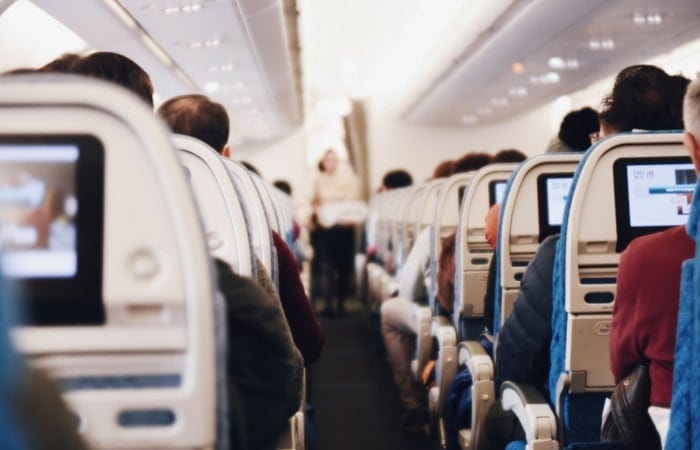
Last updated on March 21st, 2022 at 04:55 pm
Traveling with children is stressful, especially with infants. With my singleton, I took complete advantage of the “free to fly until the age of 2 years old” policy. I’ve been asked why I haven’t taken advantage of it with my twins. Don’t get me wrong, “FREE” is very tempting, particularly when you make a 1200 mile drive every year. An hour and a half in an airplane sounds a lot better than 12 hours in a car, but still, the thought of flying with infant twins gives me anxiety. If you’re like me, knowledge is power, so here’s what you need to know when traveling with littles.
Age requirements for children
Infants as young as 2 days old are allowed to fly, however, if you are traveling with an infant 14 days old or younger (age depends on the specific airline) you will need a physician’s release stating it’s appropriate for the newborn to fly. You may travel with ONE infant in your lap without purchasing a ticket if:
- An infant is less than 2 years old and
- You are at least 18 years old and
- Traveling inside the United States
Be prepared to present proof of age for any child under the age of 18 years old. Birth certificate or passport will be accepted for proof of age. It is recommended that you bring a birth certificate for any lap infant.
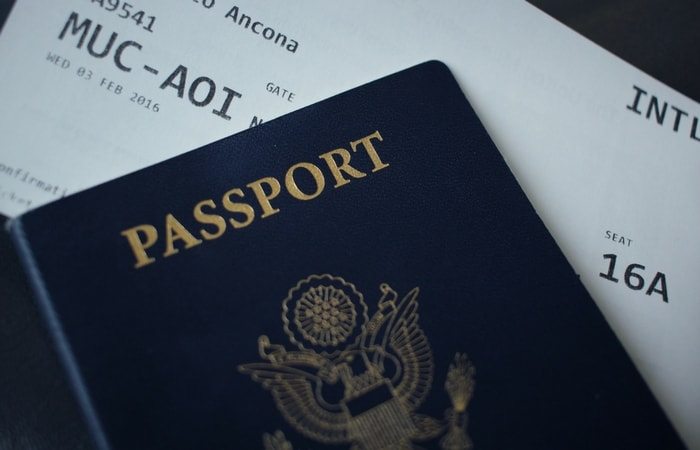
A ticket is required if:
- Your child is 2 years of age or older
- Child turns 2 years of age during a trip
- Prefer the child to sit in a seat with approved restraints
- Have a second child (regardless of age) and you already have a child who will be sitting on your lap
- Traveling between countries, regardless of whether or not the child occupies a seat
Take note that you cannot have two lap infants in the same row because there are not enough oxygen masks. This is discussed in detail below in the section “On the plane”.

Need some twin parent friends? Get the support you need with a Twiniversity Membership. Benefits include a monthly twin parent club meeting on Zoom, access to a private Facebook group just for twin parents, and a video library of twin parenting lessons. Visit Twiniversity.com/membership to join today!
Getting through security
The TSA requires that only passengers who are 18 years of age and older show valid photo identification. If traveling with an infant in the U.S., you will not be required to show any ID for the infant. However, if you are traveling internationally, you will need a passport for your infant.
Breast milk, formula, and baby food are exempt from the TSA liquid requirements. You are allowed to bring more than 3.4 ounces of breast milk, formula, milk products, juice, bottled water, baby food and essential non-prescription infant/child medication through security. Unlike other liquids, you do not need to place these items in a zip-top bag. You must still declare them for inspection and it is likely you will need additional screening on these items. Not to worry, these screenings are completely harmless. Follow these guidelines if bringing ice packs and a cooler for breast milk or pre-mixed formula. It’s a good idea to purchase ready-made formula single-serving bottles for travel.
All passengers, regardless of age, will go through the airport security screening process. Children 12 and under can leave their shoes, light jackets, and headwear on during screening. Infants and children need to be removed from their carriers and carried through the walk-through metal detector. Infants may be carried in a sling through the walk-through metal detector but may be subject to additional screening. When traveling alone with multiples, you will need to carry both children through the metal detector at the same time. Children will not be separated from their parent. If you have TSA Pre-check, children up to the age of 12 are allowed to use Pre-check with you even if they do not have their own KTN (known traveler number).
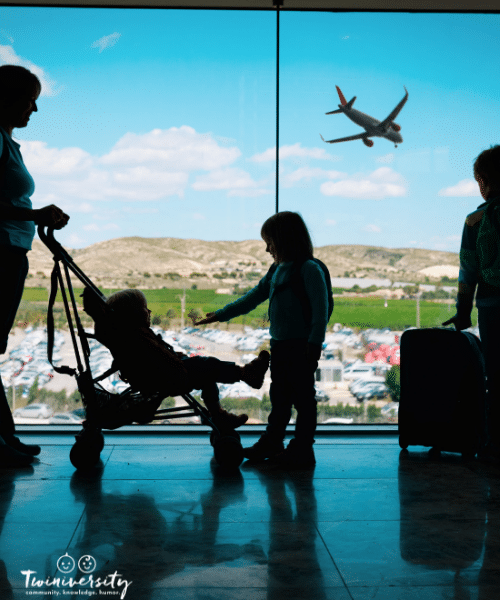
Getting through with all the extras
Strollers and all baby carriers will need to be screened by X-ray and or manually. If you have a stroller and car seat, only one can be checked at the gate. If you are not planning to use the car seat on the plane, you will want to check it at the ticket counter. On some airlines, strollers over 20 lbs must be checked at the ticket counter and strollers under 20 lbs can be used in the airport and then checked at the gate. Check ahead with your carrier to find out their rules for stroller weight. If you must check your double stroller at the ticket counter, plan to use baby carriers throughout the airport.
Some airlines do not allow an additional carry-on or personal item for a non-ticketed infant. Your diaper bag will count as either your carry-on item or personal item. If this is the case, make your purse your diaper bag. Honestly, I can’t imagine having a suitcase, purse, diaper bag and three children to keep track of. Airline travel tips suggest you overpack on diapers, wipes, baby food, snacks and a change of clothes.
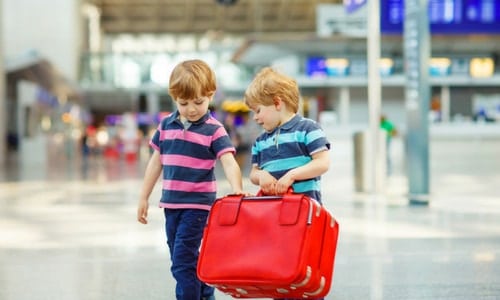
On the plane
A limit of two infants, less than two years old, per adult may travel together. So, if you are planning on flying alone with twins (you are my hero if you do), you will need to purchase a seat for one of them.
When two adults travel together with two lap infants, only one lap infant is allowed per row (this includes both sides of the row). This is due to oxygen mask allocation. The closest you can sit together is one row behind the other. Essentially the only way for two parents with lap twins to sit in the same row is to buy a seat for one of their infants. Lap infants are not allowed in the exit rows or the rows before and after the exit rows. Keep this in mind when choosing your seats.
Whether you buy a seat for your infant or get lucky enough to have an empty seat next to you, your infant will need to be securely fastened in a government approved Child Restraint System (CRS).
FAA approved Restraints:
- Must be manufactured on or after February 26, 1985
- Must be labeled: “Certified for use in motor vehicles and aircraft. This child restraint device conforms to all applicable federal motor vehicle safety standards.”
- Seats approved by the United Nations or Foreign Governments must have stamp/decal indicating foreign government approval
- 16” wide or smaller
- Rear-facing car seat for infants less than 20 lbs.
- Forward-facing restraints for children 20-40 lbs.
- Child Aviation Restraint System (CARES) is the only harness type non-car seat device approved for use on board. ( CARES is a belt-and-buckle device that works in conjunction with the regular airplane seat belts and provides the same level of safety as a car seat. For more information check out kidsflysafe.com ).
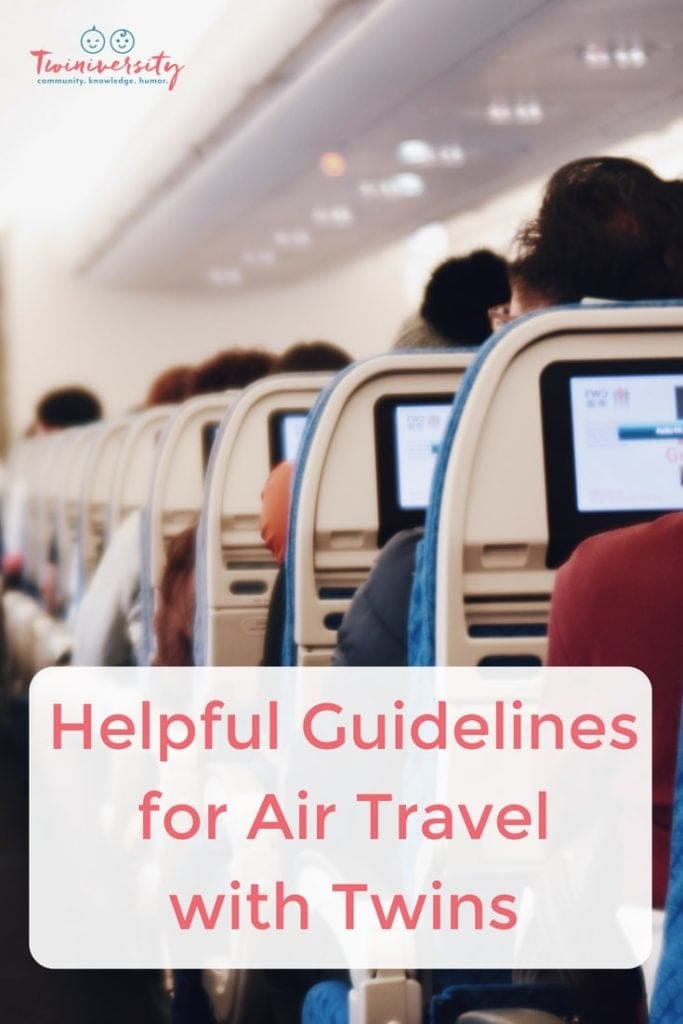
Other FAA rules to live by for air travel with little ones
Airlines require that car seats be placed in a seat next to a window so as to not interfere with other passengers’ mobility. Once your child is 40 lbs or above, they are free to use the airplane seat belts.
This is a lot of information to take in. And honestly, I’m still terrified to fly with my twins. At least I feel like I am now in the know when it comes to flying with infants, and that alone has a calming effect. All airlines have different policies and procedures, so always check with the airline prior to departure.
Good luck and safe travels to all!
Helpful links:

Amanda Hadley is a part-time photographer and full-time dishwasher, cook, maid and financial assistant to her 5-year-old daughter, one-year-old twins, and husband of 8 years. She loves to travel, take naps and Atlanta Braves baseball. Most days you will find her at home sifting through the massive piles of laundry and dishes, and getting as many cuddles as possible before the kiddos are too cool to hang out with mom.
Latest posts
Twin parent reviewers needed, how far apart were your twins born, best twin breastfeeding chair.
- Why Every Twin Family Should Invest in a Single Stroller
- Tongue and Lip Ties in Twins
Related Articles
5 Tips for Taking an International Flight With Twins
10 Essentials When Flying With Twins
Flying Alone With Infant Twins
Subscribe to Our Mailing List
Due Date or Twins Birthdate
Staying Informed
Yes! I would like to get Twiniversity emails about giveaways, events, weekly article roundups, and more!

Recent Posts

Subscribe to Twiniversity
Sign up for twiniversity twin parent emails subscribe today to get emails about giveaways, events, weekly article roundups, and more.
- Press/Media
- Disclaimers/Policies
- Twin Classes
- Twin Resources
Affiliate Disclosure: Some Twiniversity posts contain affiliate links. If you click on an affiliate link and decide to buy a product, Twiniversity gets a percentage of the sale, at no cost to you. This allows us to keep Twiniversity.com free for our community. Thank you for supporting us!
Appointments at Mayo Clinic
- Pregnancy week by week
Is it safe to fly during pregnancy?
Generally, air travel before 36 weeks of pregnancy is considered safe for people who aren't dealing with any pregnancy problems. Still, if you're pregnant, it's a good idea to talk with your health care provider before you fly.
Your provider might suggest that you not fly if you have certain pregnancy complications that could get worse because of air travel or that could require emergency care. Examples include a history of miscarriage or vaginal bleeding, severe anemia, and high blood pressure or diabetes that's not well controlled. If you had preeclampsia during a previous pregnancy — a condition that causes high blood pressure and extra protein in urine — flying may not be advised. The same is true if you're pregnant with twins or other multiples.
Tell your provider how far you are flying, as the length of the flight might make a difference. Also, be aware that some airlines may not allow pregnant people on international flights. Check with your airline before you make travel arrangements.
After 36 weeks of pregnancy, your health care provider may advise against flying. And some airlines don't allow pregnant people to fly after 36 weeks. The airline also may require a letter from your health care provider that states how far along in your pregnancy you are and whether flying is advised.
If your health care provider says it's okay for you to fly, and your plans are flexible, the best time to travel by air might be during the second trimester. The risks of common pregnancy emergencies are lowest during that time.
When you fly:
- Buckle up. During the trip, keep your seatbelt fastened when you are seated, and secure it under your belly.
- Drink plenty of fluids. Low humidity in the airplane could cause you to become dehydrated.
- Avoid gassy foods and drinks before you fly. Gases expand during flight, and that could make you uncomfortable. Examples of foods and drinks to avoid include broccoli and carbonated soda.
- Think about medical care. Plan for how you'll get obstetric care during your trip if you need it. Bring copies of your medical information in case you need care while you're away.
Blood clots
Air travel can raise the risk for blood clots in the legs, a condition called venous thrombosis. The risk is higher for pregnant people. Moving your legs may help prevent this problem. Take a walk up and down the aisle every hour during the flight. If you must remain seated, flex and extend your ankles from time to time. In general, it's best to avoid tightfitting clothing, as that can hinder blood flow. Wearing compression stockings can help with blood circulation during a long flight.
Radiation exposure linked to air travel at high altitudes isn't thought to be a problem for most people who fly during pregnancy. But pilots, flight attendants and others who fly often might be exposed to a level of radiation that raises concerns during pregnancy. If you must fly frequently during your pregnancy, talk about it with your health care provider.
Mary Marnach, M.D.
There is a problem with information submitted for this request. Review/update the information highlighted below and resubmit the form.
From Mayo Clinic to your inbox
Sign up for free and stay up to date on research advancements, health tips, current health topics, and expertise on managing health. Click here for an email preview.
Error Email field is required
Error Include a valid email address
To provide you with the most relevant and helpful information, and understand which information is beneficial, we may combine your email and website usage information with other information we have about you. If you are a Mayo Clinic patient, this could include protected health information. If we combine this information with your protected health information, we will treat all of that information as protected health information and will only use or disclose that information as set forth in our notice of privacy practices. You may opt-out of email communications at any time by clicking on the unsubscribe link in the e-mail.
Thank you for subscribing!
You'll soon start receiving the latest Mayo Clinic health information you requested in your inbox.
Sorry something went wrong with your subscription
Please, try again in a couple of minutes
- Allergy medications during pregnancy
- AskMayoExpert. Health considerations for air travelers: Pregnancy considerations. Mayo Clinic; 2022.
- Air Travel During Pregnancy: ACOG Practice Bulletin No. 746. American College of Obstetricians and Gynecologists. https://www.acog.org/clinical/clinical-guidance/committee-opinion/articles/2018/08/air-travel-during-pregnancy. Accessed Dec. 1, 2022.
- Ram S, et al. Air travel during pregnancy and the risk of venous thrombosis. American Journal of Obstetrics and Gynecology. 2022; doi:10.1016/j.ajogmf.2022.100751.
Products and Services
- Available Solutions for Prenatal Nutrition from Mayo Clinic Store
- A Book: Taking Care of You
- A Book: Obstetricks
- A Book: Mayo Clinic Guide to a Healthy Pregnancy
- Ankle swelling during pregnancy
- Antibiotics and pregnancy
- Aspirin during pregnancy
- Pregnancy back pain
- Falling during pregnancy: Reason to worry?
- Fetal ultrasound
- Flu shot in pregnancy
- Headaches during pregnancy: What's the best treatment?
- Iron deficiency anemia during pregnancy: Prevention tips
- Leg cramps during pregnancy
- Pregnancy acne
- Pregnancy and fish
- Pregnancy constipation
- Pregnancy diet: Essential nutrients
- Pregnancy due date calculator
- Pregnancy exercises
- Pregnancy nutrition don'ts
- Pregnancy stretches
- Pregnancy weight gain
- Pregnant. Now What Happens?
- Prenatal testing
- Prenatal vitamins and pregnancy
- Sex during pregnancy
- Twin pregnancy
- Vaccines during pregnancy
- Vaping during pregnancy
- Working during pregnancy
- X-ray during pregnancy
Mayo Clinic does not endorse companies or products. Advertising revenue supports our not-for-profit mission.
- Opportunities
Mayo Clinic Press
Check out these best-sellers and special offers on books and newsletters from Mayo Clinic Press .
- Mayo Clinic on Incontinence - Mayo Clinic Press Mayo Clinic on Incontinence
- The Essential Diabetes Book - Mayo Clinic Press The Essential Diabetes Book
- Mayo Clinic on Hearing and Balance - Mayo Clinic Press Mayo Clinic on Hearing and Balance
- FREE Mayo Clinic Diet Assessment - Mayo Clinic Press FREE Mayo Clinic Diet Assessment
- Mayo Clinic Health Letter - FREE book - Mayo Clinic Press Mayo Clinic Health Letter - FREE book
- Healthy Lifestyle
- Expert Answers
- Air travel during pregnancy Is it safe
Make twice the impact
Your gift can go twice as far to advance cancer research and care!
Watch CBS News
California Governor Newsom launches abortion travel ban ad campaign in Alabama
By Dave Pehling
Updated on: April 22, 2024 / 1:41 PM PDT / CBS San Francisco
California Governor Gavin Newsom is taking aim at states considering abortion travel bans with the launch of a new ad campaign.
Newsom's Campaign for Democracy ad is set to air in Alabama starting Monday. The governor tweeted out the ad in a social media post Sunday morning.
Alabama’s abortion ban has no exceptions for rape or incest. Now, Republicans are trying to criminalize young women’s travel to receive abortion care. We cannot let them get away with this. pic.twitter.com/gHbYJYlEXk — Gavin Newsom (@GavinNewsom) April 21, 2024
The text with the video post reads, "Alabama's abortion ban has no exceptions for rape or incest. Now, Republicans are trying to criminalize young women's travel to receive abortion care. We cannot let them get away with this."
The 30-second commercial shows two nervous young women driving in a car passing a sign that reads "State Line 1 Mile."
"We're almost there. You're gonna make it," the passenger tells the woman behind the wheel just before they hear a siren and are pulled over by a state trooper.
"Trump Republicans want to criminalize young Alabama women who travel for reproductive care," a voiceover says as the state trooper walks up to the car.
"Miss, I'm going to need you to step out of the vehicle and take a pregnancy test," the trooper says, waving a test stick in one hand. The next shot shows the driver leaning on the hood of her car as the trooper puts her in handcuffs.
"Stop them by taking action at RightToTravel.org ," the voiceover intones as the ad ends.
Alabama is currently weighing a bill that would make it a crime to help women travel outside the state in order to receive an abortion. The ad is part of a larger effort to combat travel bans across the United States. Newsom was behind a similar ad that ran in Tennessee.
The RightToTravel.org website says that those two states and Oklahoma are considering bills that ban minors from traveling out of state to get an abortion without parental consent, even if it's a case of incest or if there is abuse in the family.
It isn't the first action the governor has taken in the political battle over abortion since the U.S. Supreme Court overturned Roe v. Wade in June of 2022. Two days after the ruling, Newsom partnered with the governors of Oregon and Washington to issue a multi-state commitment promising to defend access to reproductive health care, including abortion and contraceptives.
In September of that year, he launched a billboard campaign in seven of the most restrictive anti-abortion states urging women seeking the procedure to come to California for treatment. He also signed more than a dozen new abortion laws protecting women's reproductive rights and ordered the state to end its contract with Walgreens after the pharmacy giant indicated it would not sell an abortion pill by mail in some conservative-led states .
- Gavin Newsom
- Roe v. Wade
Dave Pehling started his journalism career doing freelance writing about music in the late 1990s, eventually working as a web writer, editor and producer for KTVU.com in 2003. He moved to CBS to work as the station website's managing editor in 2015.
Featured Local Savings
More from cbs news.

Track work near Orinda BART station affecting travel between Rockridge, Lafayette

Recently returned from China, London Breed takes mayoral campaign to San Francisco streets
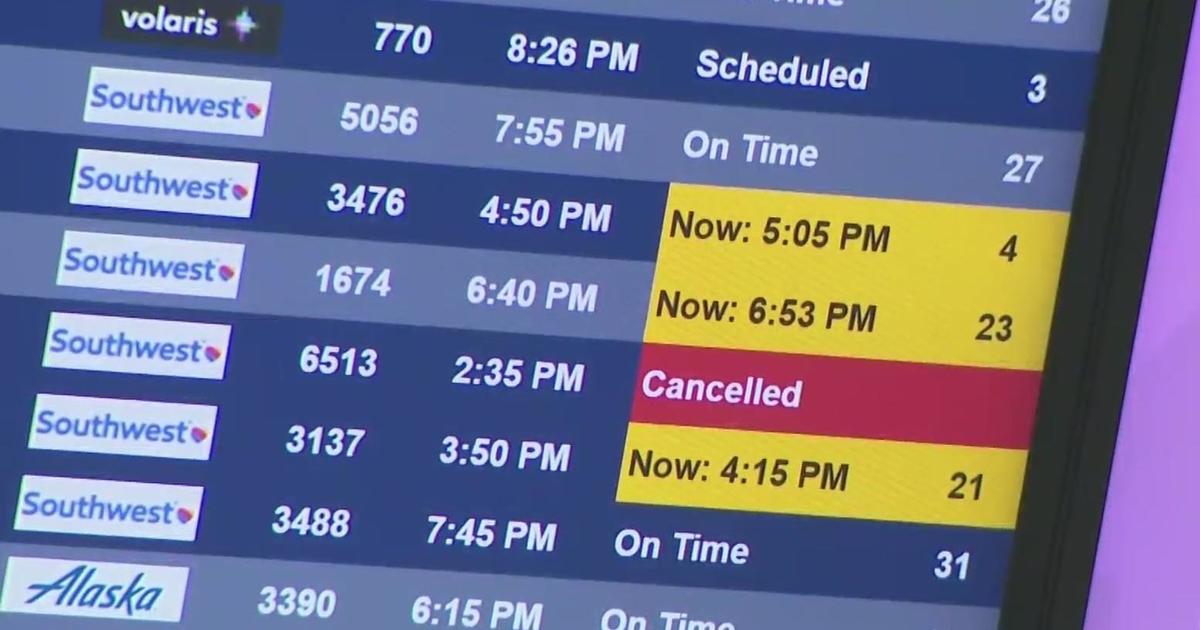
Bay Area air travelers welcome new refund rules on canceled flights, lost luggage

Horn Barbecue reopens in downtown Oakland hoping to join neighborhood revival

IMAGES
VIDEO
COMMENTS
The ideal time for pregnant women to travel is during mid-pregnancy or second trimester. If you are like most women, you will notice that your nausea is waning and you are regaining your energy. Your appetite is better, fatigue is quite manageable, and there is a lesser urge to pee. If you are planning a babymoon with your spouse or partner, it ...
Traveling by car during a twin pregnancy can be a bit more challenging and requires additional safety precautions. The safety and well-being of both the mother and the babies should be the top priority when embarking on a road trip. Here are some recommended safety precautions for traveling by car during a twin pregnancy:
Traveling by car can be a convenient option for pregnant women expecting twins, particularly in the earlier stages of pregnancy. However, it is important to make sure you are comfortable and taking breaks for rest and stretching during longer car rides.
How to Fly with Twins: All airlines allow children under the age of 2 to sit on an adult's lap, but only 1 child under 2 can sit on each adults lap. Keep in mind that not all airlines allow one adult to travel alone with two children under the age of 2. **See below for tips on traveling alone with twins and more about flying with twins alone.
Safety tips for pregnancy car travel. A safe car trip is a comfortable one. Keep the following tips in mind the next time you drive: Limit car time. If you're planning a longer road trip, be sure to limit your drives to six hours per day max or spread your trip over a few days so you can drive for shorter stretches. Take frequent pit stops.
Dr. Gaither says pregnant travelers should stop "at least every two hours" and get out of the car, stretch, and walk around. This increases blood flow to the lower body which helps prevent ...
Ask your airline if they have a cut-off time for traveling during pregnancy. You can fly on most airlines up to 36 weeks of pregnancy. But if you're flying out of the country, the cut-off time may be earlier. Check to see what medical care your health insurance covers. Health insurance helps you pay for medical care.
In general, most airlines allow pregnant women to travel up until a certain gestational age, typically around 36-37 weeks for a singleton pregnancy. However, for twin pregnancies, the cut-off point may be earlier, often between 28-32 weeks, depending on the airline.
Traveling during a twin pregnancy can be an exciting adventure, but it is important to keep in mind the restrictions and guidelines that come with carrying twins. Whether you are planning a vacation or a business trip, understanding the precautions that need to be taken is essential for a safe and comfortable journey.
It's generally recommended that women can travel by airplane, car, etc., up to 36 weeks of their pregnancy. After 36 weeks, we recommend that they don't travel more than an hour away from where they plan to deliver. For example, if they live in the South Bay, they can travel to San Francisco or San Jose, or even as far as Napa or Carmel.
Traveling during a twin pregnancy can be challenging, but with careful planning and preparation, it is possible. Learn about the potential risks and precautions to take while traveling with twins, as well as tips for a safe and comfortable journey.
Get Your Car Ready for a Long Road Trip While Pregnant. Nothing ruins a vacation faster than breaking down on the side of the road. So before you start out on a long car ride, make sure your car is up-to-date on routine maintenance. Also, confirm that: Your tires (including your spare) are in good shape and inflated correctly.
The best time to travel is mid-pregnancy (14 to 28 weeks). During these weeks, your energy has returned, morning sickness is improved or gone, and you are still able to get around easily. After 28 weeks, it may be harder to move around or sit for a long time. ... Read Car Safety for Pregnant Women, Babies, and Children for more advice.
Pregnancy travel by car has some of the same risks and rules as traveling by plane, says Nye. "The big problem is blood clots," she says. "If you are in a car and driving long distances, get out ...
Stand up and stretch. Pregnant women are at higher risk for developing blood clots, so it's important to avoid sitting still for long periods of time. Wear loose clothes and keep the blood flowing in your legs: Whether you're flying or driving, take breaks to get up, walk around and stretch every half hour or so.
My OB said not to travel anywhere more than 2 hours away from the hospital after 28 weeks. I will be 29 at thanksgiving & my parents are 2 hours away (3 from the hospital) but I think I'm going to go - my mom works at the hospital! t. tvlbunny. Nov 1, 2014 at 8:21 PM. My OB said 32 weeks for flying.
Best Age to Travel with Twins. To have the best experience when you decide it's time for twin travel, you may want to wait until they are at least 5 or 6 years old. Waiting until your twins are a little older will make it easier for them to handle the experience, but even babies can travel in certain circumstances.
Some women prefer not to travel in the first 12 weeks of pregnancy because of nausea and vomiting and feeling very tired during these early stages. The risk of miscarriage is also higher in the first 3 months, whether you're travelling or not. Travelling in the final months of pregnancy can be tiring and uncomfortable.
Check the airline restrictions - Flying is not harmful to you or your baby. However different airlines have different rules about travelling while pregnant. Most will allow you to fly until about 36 weeks (32 weeks with twins or multiples) but they will require a letter from your doctor once you've over 28 weeks to confirm you're fit and ...
Air travel is safe for pregnant mothers. If your doctor clears you for flying, your primary goal is to keep Mom comfortable and healthy on the trip. To ease your travel, make sure that Mom has an aisle seat so that she can get up and move around during the flight to stretch her legs. Ideally, she would get up to walk around every 30 minutes or so.
A limit of two infants, less than two years old, per adult may travel together. So, if you are planning on flying alone with twins (you are my hero if you do), you will need to purchase a seat for one of them. When two adults travel together with two lap infants, only one lap infant is allowed per row (this includes both sides of the row).
Generally, air travel before 36 weeks of pregnancy is considered safe for people who aren't dealing with any pregnancy problems. Still, if you're pregnant, it's a good idea to talk with your health care provider before you fly. Your provider might suggest that you not fly if you have certain pregnancy complications that could get worse because ...
Governor Gavin Newsom is taking aim at states considering abortion travel bans with the launch of a new ad campaign. ... young women driving in a car passing a sign that reads "State Line 1 Mile ...